北朝鮮での日常的な、逃れられない性的虐待-PSCORE [ENG]
こんにちは。北朝鮮で蔓延している性的虐待についてお伝えします。
Hello! Today we would like to write about sexual abuse that is commonplace in North Korea.
(Sexual Abuse)
子ども、特に若い女の子は、様々な加害者から性的虐待を受けるリスクが高くなっています。 25.6%の北朝鮮脱北民が性的虐待を経験しているのです。
北朝鮮で最も蔓延している児童の性的虐待は、不適切な性的接触です。
レイプは北朝鮮でも蔓延しています。 多くの場合、子供たちはとても若いため、何が起こっているのかさえ知りません。 レイプやその他の形態の性的虐待の被害者が虐待を報告する可能性は低く、そのために加害者は通常罰則を受けることがありません。
「私は人形で遊んでいましたが、彼は別の遊びをしようと言いました。 痛くて嫌だったことを覚えています。 彼は言いました、「心配しないで、あと10数えよう、10、9、8 …」[…]私は泣き続け、嫌だと言い続けましたが、両親は私に起こった出来事を理解していませんでした。 3回目に彼と私を一緒にした以降、両親はようやく私を彼から遠ざけることにしました。」
– 北朝鮮の女子学生(2014年に脱北)
Children, especially young girls, are at a high risk of being sexually abused by a wide range of perpetrators. 25.6% North Korean refugees experienced sexual abuse. 43.9% have experienced two or more types of abuse (sexual, physical, economic, and or emotional abuse).
The most widespread form of child sexual abuse in North Korea is sexually inappropriate touching.
Rape is also prevalent in North Korea. Oftentimes, the children are so young that they do not even know what is occurring. Victims of rape and other forms of sexual abuse are unlikely to report their abuse. Thus, perpetrators unusually face no penalties.
“I was playing with my doll and he said we’d play a different game. I just remember thinking it was painful and did not like it. He said, “Don’t worry, let’s just count, just ten more, ten, nine, eight…” […] I kept on crying and saying I did not like him, but my parents did not understand what happened to me. After the third time leaving me with him, they decided to keep me away from him.”
– Female North Korean student (escaped in 2014)
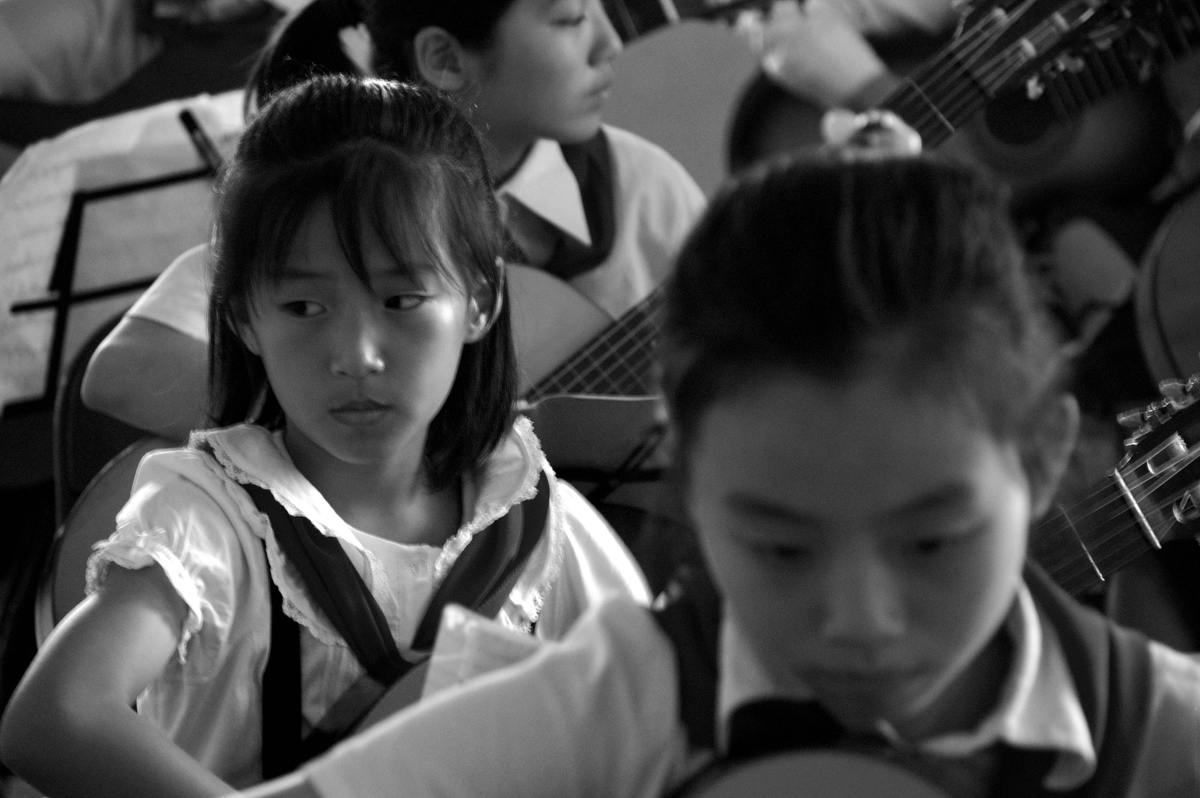
「年齢に関係なく、男性に会うたびに鳥肌が立ちます。 私には男性は全てそのように見えるのです。男性に追われるという多くの悪夢もみました。」
-ウンヨン
“I’ve got goosebumps whenever I see a man, regardless of their age. That’s the only way any of them appear to me… I’ve had many nightmares of being chased by men.”
– Eun-Young
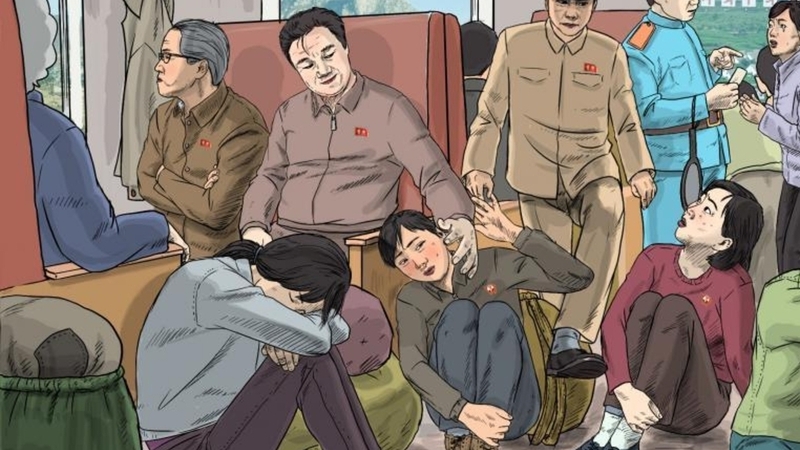
被害者が虐待を通報しない理由
①被害者非難を恐れているため
北朝鮮では被害者非難と社会的不名誉の制度が非常に強力であるため、被害者の親しい友人や家族でさえ、当局を含む誰にも虐待について話すことができません。
「私たちの近所では、女性が3人の兵士に集団強姦されました。 私は人々が彼女について話しているのを聞きました。 彼らは3人の兵士が誰であるかについて触れることはありませんでした。 彼女が何をされたかについてのみ話し合っているのです。 そのような環境で女性はどのようにして性的虐待の犠牲者であると言うことができるでしょうか?」–ウンジュ
②「児童の性的虐待」の概念がない
北朝鮮では性的虐待が広く受け入れられており、犯罪行為としての理解さえされていません。
学校では、性行為、避妊、または性感染症についての教育はされていません。 性的虐待は犯罪であるということを学生に認知させる努力はなされておらず、人々は意図的に無知の状態にされているのです。
今日でも、北朝鮮の男性は女性の子どもを「未成年者」とは見なしておらず、性的対象としているために恥や罪悪感を感じていません。 「未成年者の保護」という概念は存在していないのです。
Why Victims do not report their abuse
1.Stigmatization and victim-blaming
The institutionalization of victim-blaming and social stigmatization is so strong that even victims’ closest friends and family members discourage them from telling anyone, including the authorities, about their abuse.
“In our neighborhood, a woman was gang-raped by 3 soldiers. I heard what people were saying about her. No one talked about who the 3 soldiers were. They only discussed what they did to her. (In such an environment) how could women speak up that they are victims (of sexual abuse)? – Eun-Joo
2. No concept of “child sexual abuse”
Sexual abuse is deeply accepted in North Korea that it is not even understood as a criminal act.
In school, there is no education about sex, contraception, or sexually transmitted diseases. There is no effort to make students aware that sexual abuse is a crime, and people are intentionally kept ignorant.
Even today, men in North Korea do not view female children as “underage” and have no feeling of shame or guilt as they sexualized them. The concept of “protecting the underage population” does not exist.

性的虐待体験者の話
(Stories of young women who experienced sexual abuse)
10歳の時、スジンはある男の世話をしていました。 彼女が眠っている間、彼はスジンの体に触れました。 それは彼女が家に滞在している間何度も続き、それは約一ヶ月続きました。 最初、彼はスジンの体をまさぐっただけでした。 しかし、だんだん男はスジンの小さな手を使って自分の体をこすり、押し付け始めました。 スジンは今でもその感覚を鮮やかに覚えています。 当時、彼女は恥ずかしくて混乱していました。 不快な気持ちになり鳥肌が立ちましたが、なぜ彼女はそのように感じたのか、そしてなぜ彼がそのようなことをしているのか正確には分かりませんでした。
ある脱北者のジヨンは、7歳のある夜、家にいる多くの人々の間に挟まれて眠っていたとき、なじみのない感覚に目が覚めたと語りました。彼女の手は母親のいとこである男性のズボンの中にありました。7歳の子どもであるジヨンにとってはまったくなじみのない状況だったので、何が起こっているのか分かりませんでした。その不快な感覚は今でも彼女の記憶に残っています。当時、彼女にできることは、寝ているふりをして、その虐待者が家にいる間は彼を避けようとすることだけでした。
一年後ジヨンが8歳の時、親戚の世話をしていました。その家では、普段5人以上が小さな部屋を共有して寝なければなりませんでした。ジヨンはこの家に泊まるのを楽しんでおらず、よく泣きました。ある夜、誰かが自分の上に乗るのを感じたとき、彼女は静かにすすり泣きました。彼女は服の下で誰かが素肌をまさぐっているのを感じましたが、あえて目を開けませんでした。全員が部屋で一緒に寝ていて、加害者の妻はすぐ隣で寝ていました。ジヨンは彼らを起こしたくありませんでした。より正確に言えば、彼らが目覚めたとしても、見ないふりをされるのではないかと思ったのです。ジヨンは誰も自分を助けてくれるとは思いませんでした。彼女がまるで眠りにつくようにゆっくりと体を動かしたら、幸いなことに彼は静かに彼女から降りました。ジヨンはとても怖くてショックでしたが、どういうわけか他人に起きていることを知られてはいけないと思い、すすり泣きを抑えるのに必死でした。
彼女が17歳になり、背が高く成熟した女性になると、性的虐待がより頻繁に発生しました。ある日は相手は叔父の友人であり、またある日は叔母の友人などでした。彼らはジヨンに触れたり、ズボンの中に手を入れさせたりしました。それが起こったとき、彼女はいつも目を覚ましていましたが、それを決して気づかれないようにしました。虐待者たちは彼女の家で何日も過ごしていたので、彼女は日中彼らと顔を合わせざるをえませんでした。
ある夜、ピンドゥという麻薬に夢中だった叔父が彼女を襲いました。ジヨンの人生で初めて、彼女は全力で抵抗し、彼を押しのけました。彼女の中で溜まっていた怒りと悲しみは一気に爆発し、彼女は彼に向かって叫びました。叔父はまだ酔っていましたが、涙で濡れたジヨンの顔を見て謝罪しました。しかし、ジヨンはもう我慢できませんでした。彼女は彼女の継母に彼女の叔父の虐待について話しました、そして、彼女の継母は彼がジヨンの父によって罰せられるであろうと彼女に保証しました。しかし、その日遅く、彼女の父と叔父は一緒に笑って帰宅しました。彼女の叔父は罰せられるどころか、ジヨンの父親と冗談を言っていたのです。ジヨンはひどくショックを受けました。父親に話さなかったのが継母であろうと、父が知らないふりをすることを選んだのであろうと、ジヨンは自分が守られていないと感じたのです。
その日から、彼女の叔父は暴力的になりました。彼はすぐに食事を出さなかったジヨンを平手打ちし、絶えず彼女を殴るようになりました。それで、ある日叔父が再び彼女を殴ろうとしたとき、ジヨンは服だけを持って家を出ました。その日、ジヨンは北朝鮮を去りました。
10年以上経ちましたが、ジヨンは7歳の時からの性的虐待の事件を覚えています。レイプされなかったのは幸運だったと周りには言われますが、本当に幸運だったのでしょうか。
Su-jin
At the age of 10, Su-jin stayed in the care of a man. He would touch Su-jin's body while she was asleep. It continued many times throughout her stay in the house, which lasted around a month. At first, he only groped Su-jin's body. But as time passed, the man also started taking Su-jin's small hand to rub and press against his own body. Su-jin still remembers the sensation vividly. At the time, she felt ashamed and confused. The feeling was unpleasant and gave her goosebumps, but she didn't know exactly why she felt those things and why he was doing what he was doing.
Ji-young
One defector, Ji-young, told PSCORE that one night when she was 7 years old, as she was asleep wedged among the many people in her home, she awoke to an unfamiliar sensation. Her hand was inside one of the guest's pants, a man who was her mother's cousin. Ji-young was unsure of what was happening, as it was a completely unfamiliar situation for a 7-year-old. However, the unpleasant sensation remains stark in her memories to this day. At the time, all she could do was pretend to sleep and try to avoid her abuser for the rest of his stay.
A year later, when Ji-young was 8-years-old, she spent some time in the care of her relatives. In that house, usually 5 or more people had to share a small room to sleep. Ji-young did not enjoy staying at this house and often cried. She was quietly sobbing one night when she felt someone climb on top of her. She felt a hand grope her bare skin under her clothes, but she did not dare open her eyes. Everyone was sleeping together in the room, and the perpetrator's wife was sleeping right next to them. Ji-young didn't want to wake them, or more accurately, she was afraid that even if they did awaken, they would pretend not to see. Ji-young did not think any of them would help her. Slowly, she turned her body as if turning in her sleep and fortunately, he quietly got off of her. Ji-young was very scared and felt devastated, but it occurred to her that for some reason, she shouldn't let the others find out that she was awake, so she did her best to stifle her sobbing.
When she was 17-years-old, taller, and more mature, the sexual abuse occurred more often. Some days it was her uncle's friend, and on other days it was her father's friend or her aunt's friend and so on. They would touch Ji-young or put her hand inside their pants. She was always awake when it happened, but never made it known. The abusers would spend days at her home, and she had no choice but to face them during the day.
One night, an uncle who was high on a drug called “pingdu” assaulted her. For the first time in Ji-young's life, she resisted with all her strength and pushed him off. The anger and sorrow she had been bottling up exploded all at once and she shouted at him, demanding him to explain himself. The uncle was still intoxicated, but he saw her tear-stained face and apologized. However, Ji-young could stand it no longer. She told her stepmother about her uncle's assault and her stepmother assured her that he would be punished by Ji-young's father. However, later that day her father and uncle came home laughing together. Far from being punished, her uncle was exchanging jokes with Ji-young's father. Ji-young felt devastated. Whether it was her stepmother who hadn't told her father, or her father choosing to ignore what happened, Ji-young felt like she was not being protected.
After that day her uncle became violent. He slapped Ji-young for not serving his meal promptly and began to hit her constantly. And so, one day when her uncle again tried to hit her, Ji-young left the house with nothing but the clothes on her back. That was the day Ji-young left North Korea.
More than 10 years have passed, but Ji-young still remembers each incident of sexual abuse, all the way back to when she was just 7 years old. People tell her how fortunate she was not to have been raped, but one cannot help but ask, was she truly fortunate?
次回はネグレクト(養育放棄)についてお伝えしていきます!
私たちのウェブサイトはこちらから▶️http://pscore.org/home-ja/
お読みいただきありがとうございました!
Visit our website! ▶️http://pscore.org/home/
Thank you for reading! :)
北朝鮮の恐ろしい児童虐待-PSCORE [ENG]
こんにちは!今回は、北朝鮮で蔓延している児童虐待についてお伝えしていきます。
北朝鮮には児童虐待という概念がないため、暴力の慣習が浸透し、北朝鮮の子供たちとその発達に長期的な悪影響を及ぼしています。
Hello! This time we would like to tell you about one of North Korea's ongoing human rights violations, child abuse.
Since there is no concept of child abuse in North Korea, a culture of violence permeates which has long-lasting effects on North Korean children and their development.
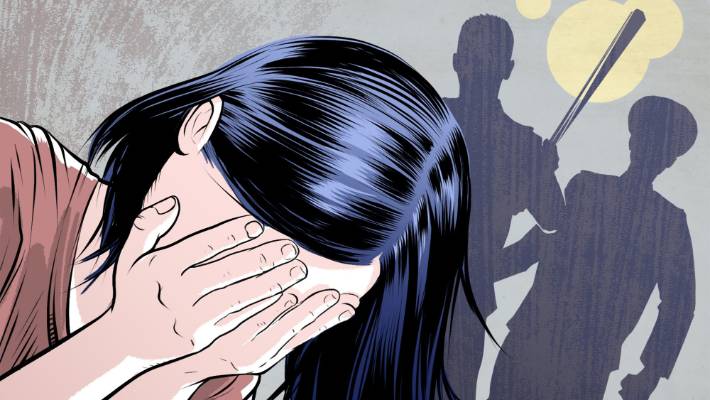
肉体的虐待
(Physical Abuse)
PSCOREのインタビューの回答者の半数は児童虐待を経験しており、85%は肉体的虐待を経験しています。
家庭での肉体的虐待
脱北者たちは、親が子どもに対して身体的に暴力を振るうことは一般的に受け入れられている習慣であると報告しています。
調査によると、社会的地位の低い回答者の52%が身体的虐待を経験しましたが、社会的地位の高い調査回答者の身体的虐待の経験割合は25%であることがわかりました。
また、暴力対象には性別によって違いがあるようです。 男性は回答者の47%、女性は回答者の40%が身体的虐待を経験したことを証明しています。
学校での肉体的虐待
肉体的暴力は、個人の家と同じように学校でも受け入れられています。 体罰は学生の日常生活の一部になっているのです。
Half of the respondents from PSCORE’s interviews have experienced child abuse and 85% of them have experienced physical abuse.
Physical Abuse at Home
In the private sphere, physical violence is commonplace in North Korea. Several defectors reported that it is a commonly accepted practice for parents to be physically violent with their children.
The testimonies indicate that the degree of violence inflicted upon children vary between parents. Surveys show that 52% of low social status participants experienced physical abuse, whereas only 25% of high social status participants have experienced such abuse.
It also seems that there is a differentiation in the use of violence based on gender. 47% of the male respondents attest to have experienced physical abuse compared to only 40% of female respondents.
Physical Abuse at Schools
Physical violence is accepted in school in the same way that it is in the private home. Corporal punishment seems to be part of the daily life of students.

公共施設での肉体的虐待
調査委員会は、虐待加害者の大多数が責任を問われていないことを報告しています。ある一人の被害者の父親が語る恐ろしい話をご紹介します。
「2011年8月、国家安全保障局(SSD)は韓国映画を見たとして彼の息子を逮捕しました。 彼は拘留中に拷問を受けました。 「私の息子の左足首は粉々に砕かれ、彼の顔は打撲傷を負い、ひどく傷を負いました。」 SSDが彼を解放するために、両親はかなりの賄賂を払わなければなりませんでした。 残念ながら、その息子は拷問が原因で脳出血を引き起こし数日後に死亡してしまいました。」
Physical Abuse in State facilities
The commission found that the majority of perpetrators are not held accountable. One terrifying story was told by a father of a victim. In August 2011, agents of the State Security Department arrested his son for watching South Korean movies. He was tortured while held in detention. “His left ankle was shattered and his face was bruised and grossly disfigured.” The parents had to give substantial bribes so that the SSD would release him. Unfortunately the boy died a few days after as a result of the torture that he endured, which caused a brain hemorrhage.
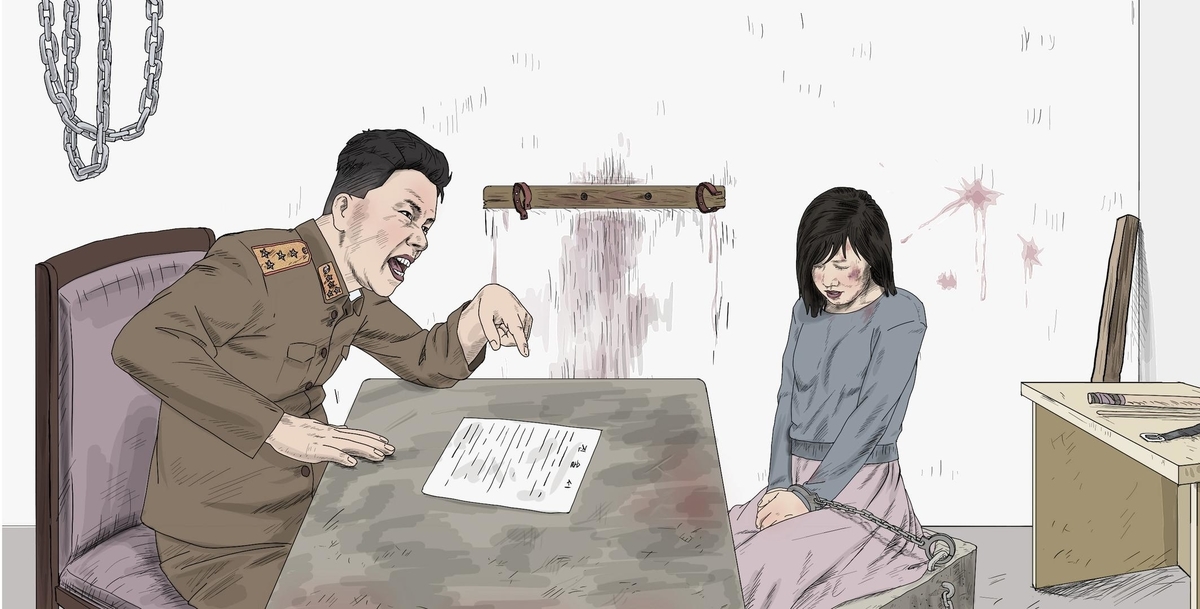
「拷問ではあなたの手は背中の後ろで手錠をかけられます。 そして、あなたは吊るし上げられ、立ったり座ったりすることができないようにされるのです。」
-チョン・クァンイル
“Your hands are handcuffed behind your back. And then they hang you so you would not be able to stand or sit.”– Jeong Kwang-Il
政治犯収容所
国家は公式には存在しないこれらの収容所に強制的に国民を収容させるという罪を犯しています。子供を含む家族全員がそこに送られます。
政治的、イデオロギー的、または経済的な「敵の部類」の人々の粛清は、元の不正行為者の第3世代までの子孫まで及びます。
ある女性は、彼女が学校からの帰りに逮捕されたときはたった13歳だったそうです。 彼女の家族全員も理由が明かされることなく逮捕されました。 逮捕の理由について尋ねたり、それについて他の囚人と話すなどしようものなら処刑されてしまうのです。
別の女性は政治犯収容所に28年間滞在し、釈放されるまで逮捕の理由を知りませんでした。 後に、朝鮮戦争中に祖父が大韓民国に逃亡したため、家族全員が逮捕されたことが判明したのです。
Political prison camps
The state is guilty of enforced disappearances into these camps that officially do not exist. Entire families are sent there including children.
Purges of political, ideological or economical “class of enemies” extend to the descendants up to the third generation of original wrongdoer.
One witness said she was only 13 years old when she was arrested on her way back from school. Her entire family was also arrested without the reason being divulged. Worse, they were told if they should enquire about the reason or talk to other inmates about it, they would be executed.
The witness stayed 28 years in the political prison and she never knew why until her release. Then, she found out that because her grandfather had fled to the Republic of Korea during the Korean War, her entire family was arrested.
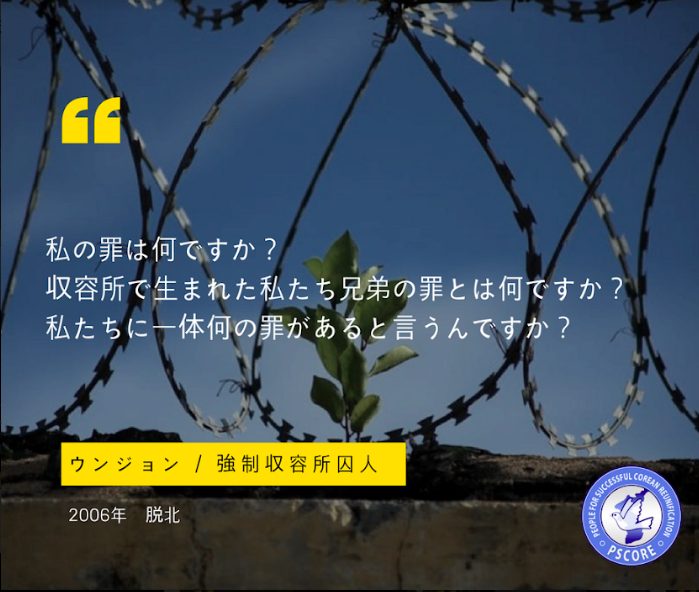
''What is my sin? What is the sin of our brothers born in the camp? What sins do we have?''-Kim Eun Jung (Concentration camp prisoner, escaped in 2006)
孤児院
国連情報委員会(COI)が収集した脱北者の証言によると、人道支援機関はこれらの施設にアクセスすることはできません。
ある少女は捕まったとき、彼女は自分の意志に反して孤児院に送られました。 到着すると、彼女は椅子の上に立たされ革のベルトで打たれたのです。
食糧不足に加えて、子供たちは一日中座って、週に一度だけ外に出てトイレをすることができました。
子供たちは、学校の時間中に畑で働くことで労働搾取されています。脱北者は、子供たちが作物を収穫し、トラックに積み込み、過酷な労働に従事しなければならないと証言しています。 北朝鮮の子供たちは、強制労働の任務を遂行できなかった場合、絶えず殴打されるのです。
Orphanages
Humanitarian agencies do not have access to these facilities (UN Committee of Information (COI) collected North Korean defector testimonies)
A girl was caught and sent to a facility for street children against her will. As she arrived she was beaten with a leather belt as she was made stand on a chair.
In addition to the lack of food, the children were to sit all day long and go outside only once a week to empty the toilets.
Children are exploited for labor by working in the fields during school hours. North Korean defector testimonies reported children having to harvest crops, loading trucks, and participating in strenuous labor. The North Korean children were constantly beaten if they were unable to complete the forced labor tasks.
次回は性的虐待についてお伝えします。次回もどうぞお楽しみに!
私たちのウェブサイトはこちらから▶️http://pscore.org/home-ja/
お読みいただきありがとうございました!
There will be Child Abuse part 2 uploaded very soon, so please look forward to it!
Visit our website as well! ▶️http://pscore.org/home/
Thank you for reading! :)
忘れられた拉致被害者たち〜今も帰郷を夢見て〜-PSCORE [ENG]
こんにちは。今日は北朝鮮による拉致事件についてお伝えします。
日本でも、「拉致」という言葉は馴染みがある言葉だと思います。
皆さんが「拉致」と聞いて一番最初に思い浮かべることはなんですか?
「横田めぐみさん」「大韓航空機爆破事件」「工作員・諜報員(スパイ)」...。
これらの単語全てが、北朝鮮に直接関連しています。
さて、北朝鮮による拉致事件の対象は、実は日本人だけではありません。北朝鮮から送り出されたスパイは世界中に潜み、犯行に及んでいるのです。
それでは、主な拉致事件について詳しくみていきましょう。
Hello. Today we would like to tell you about the abduction issues conducted by North Korea.
The word "abduction" is a familiar word to many Japanese people.
What comes up to your mind when you hear "abduction"?
"Megumi Yokota" "Korean Air Flight 858" "North Korean spies" ...
All of these words are directly related to North Korea.
The targets of the abduction by North Korea is not only Japanese. The agents (spies) sent from North Korea are lurking all over the world and committing crimes.
Let's take a closer look at the major abduction cases here.

帰国事業 日本から北朝鮮へ
(Returning from Japan to North Korea in the 1950s)
1959年に9万3千人以上が嘘の約束で、日本から北朝鮮に強制移住させられました。移住して数年経つと、日本にいる家族との連絡が絶たれました。人権調査委員会の調査結果によると、これらの人々の多くは、北朝鮮内の政治犯収容所やその他の収容所に収監され、反人倫的犯罪の対象になったのでした。これまで、100人以上の日本、韓国、その他の国の国民が北朝鮮の特殊作戦と情報要員により計画された拉致の犠牲になりました。約25人の外国人拉致被害者はヨーロッパ、中東および他のアジア地域出身者であり、すでに北朝鮮に住んでいる他の外国人と結婚させるために北朝鮮に連れて行かれたのです。
In 1959, more than 93,000 persons were coerced by false promises to move to the DPRK from Japan. However, a few years after they had moved, they were forced to cut off contact with their families in Japan. According to the COI’s findings, many of these people ended up in political prison camps or other places of detention in the DPRK where they were subjected to other crimes against humanity. Over a hundred citizens of Japan, South Korea, and other states were victims of planned abductions by special operations and intelligence agents of DPRK. Around 25 non-South Korean abductions were from Europe, the Middle East and other parts of Asia who were brought to the DPRK to become wives to other foreigners already living in the DPRK.

当時北朝鮮は「地上の楽園」と謳われた
At that time, North Korea was touted as a "paradise on earth"

(The abduction of Japanese citizens by North Korea)
1970年代から1980年代にかけて、多くの日本人が北朝鮮工作員によって北朝鮮に拉致されました。日本政府は、17名を公式な拉致被害者として認定していますが、このほかにも、日本における日本人以外の人々の拉致事件や特定失踪者も含め拉致の可能性を排除できない事案が多くあります。北朝鮮は当初国家による拉致への関与を頑なに否定していましたが、2002年に第一回日朝首脳会談が行われ、そこで、ようやく関与を認めました。同年に17人中5人の拉致被害者が24年ぶりに帰国しました。
その後、その他の日本人拉致被害者の生死を確認することができた唯一の方法は、北朝鮮政権が発表した8人の死亡宣言だけでした。これらの主張を裏付けるために、北朝鮮は死亡した日本人拉致被害者の遺骨を含むいくつかの遺品を日本の官僚に渡しましたが、日本政府は遺骨の身元が把握できず信憑性がないと判断しました。
From the 1970s to the 1980s, many Japanese were abducted by North Korean agents. The Japanese government has identified 17 people as official abduction victims, but there are many other cases in which the possibility of abduction, including cases of abduction of non-Japanese people and specific disappearances, cannot be ruled out. North Korea initially stubbornly denied any involvement in the abduction by the state, but in 2002 the first Japan-North Korea summit was held, where it finally acknowledged its involvement. In the same year, 5 out of 17 abductees returned home for the first time in 24 years.
After that, the only sign of life of the Japanese abductees was the North Korean regime’s declaration of the death of eight of them. To support these claims North Korea has handed over several things to the Japanese officials including the remains of the dead Japanese abductees. However, the Japanese government evaluated the remains and deemed them unreliable as they could not be identified.
⬇️日本政府 拉致対策本部の公式ホームページもご覧ください
Please also see the official website of the Japanese Government Abduction Issue Headquarters (ENG available)
⬇️救う会 北朝鮮に拉致された日本人を救出するための全国協議会の公式ホームページ
Please also see the official website of the Association of Families of Victims Abducted by North Korea (ENG available)

日本各地で拉致被害は確認された
Abduction cases confirmed in various parts of Japan
韓国から北朝鮮へ
(South Koreans abducted to North Korea)
1950年6月25日朝鮮戦争勃発以降、北朝鮮政権は約20万人の民間人と軍人を拉致しました。1946年金日成は “知識不足の問題を解決するために北朝鮮のすべての知識人を探し出す必要があるだけでなく、南朝鮮(韓国)の知識人も北に連れて来なければならない“ と言ったことから始まったのです。多くの韓国民が朝鮮戦争中に北に拉致されましたが、正確な行方不明者数は分かっていません。人権調査委員会は朝鮮戦争当時、北朝鮮軍によって約8万人の民間人が拉致され、数万人の民間人が送還されず抑留されていると主張しています。
北朝鮮人権白書によると朝鮮戦争以降の拉致事例は少なくとも143件、拉致被害者は少なくとも3835人です。これらのうち3310人は6ヶ月から1年間抑留された後2000年に帰還しましたが、未だ516人が行方不明の状態です。
Since the beginning of the Korean War on June 25th, 1950, North Korea’s regime abducted approximately 200,000 civilians and soldiers. In 1946, Kim Il-sung stated that “not only do we need to search out all of Northern Chosun’s intelligentsia to solve the issue of a shortage of intelligentsia, but we also have to bring Southern Chosun’s intelligentsia [to the North].” Following this time, many citizens were abducted during the Korean War. However, the exact number of missing persons remains unknown. The Commission of Inquiry on Human Rights in the Democratic People’s Republic of Korea states that approximately 80,000 civilians were abducted by DPRK forces during the Korean War with tens of thousands kept when they should have been released.
According to the White Paper on Human Rights in North Korea there have been at least 143 abductions, and at least 3,835 people were abducted since the end of the Korean War. After being held for six months to a year, 3,310 of these people were returned, but 516 are still missing.

朝鮮戦争中に拉致は行われた
Abduction was conducted during the Korean War
(1969 Korean Air Lines Hijacking)
1969年12月11日、金浦国際空港行き大韓航空YS-11機は江陵飛行場を離陸して10分後に北朝鮮工作員によってハイジャックされ、目的地から260km以上離れた咸興市近くの宣徳飛行場に強制着陸しました。旅客機には乗客46人と乗務員4人、北朝鮮工作員趙昶熙などが乗っていました。飛行機が着陸した空港で趙昶熙を待っている車があったという報道がありましたが、彼に何が起こったのかは不明です。
On December 11th, 1969, the Korean Airlines YS-11 plane from Gangneung Airbase bound for Gimpo International Airport was hijacked and changed its direction to North Korea within 10 minutes of taking off. The aircraft was carrying 46 passengers, four crew members, and the North Korean sleeper agent Cho Chang-Hee. The hijacker flew the airplane to Sondok Airfield which lies near the city of Hamhung, North Korea’s second largest city, more than 260 km away from plane’s original destination. It is unclear what happened to the hijacker, although, there are reports that there was a car waiting for him at the airport where the plane landed.

1969 Korean Air Lines Hijacking
2ヶ月後の1970年2月14日、拉致被害者50人のうち39人が板門店近くの自由の橋を渡って韓国に帰還しました。しかし乗客7人と乗務員4人、そして航空機自体はまだ行方不明のままです。朴正煕大統領(当時・1963-1979)は、1970年3月9日、当時の国連事務総長ウ・タントに旅客機の乗客11人の行方不明に関する手紙を送りましたが、国連は北朝鮮を圧迫する力がないという反応を見せました。
今日まで北朝鮮は残りの11人の拉致被害者たちが自分たちの自由意志で北朝鮮に残ることを選択したと主張しています。金大中大統領(1998-2003)の太陽政策は2001年の離散家族再会事業へとつながり、無作為に選ばれた参加者の1人がソン・ギョンフイでした。ソン・ギョンフイはハイジャックされたYS-11旅客機に搭乗した乗務員の1人であり、2001年に母親と再会した際、他の乗員はまだ生きており平壌近くに住んでいると述べたのです。彼女は北朝鮮に到着した日以降、他の拉致被害者たちの姿を見てはいないが、彼らは無事だと聞いたと話しました。
After two months, on the 14 February 1970, 39 of the 50 abductees were returned to South Korea across the Freedom Bridge near Panmunjeom. However, 7 of the passengers, all four crew members and the aircraft itself remain missing. The South Korean president Park Chung-Hee sent a letter regarding the missing 11 passengers of the flights to the UN Secretary-General U Thant on March 9, 1970. He responded admitting to having no power to pressure North Korea.
To this day, North Korea claims that the remaining 11 South Koreans have chosen to stay in North Korea out of their own free will. South Korean president Kim Dae-Jung’s sunshine policy towards North Korea resulted in family reunions taking place in 2001. One of the randomly chosen participants was Seong Gyeong-Hui, who was one of the flight attendants on the flight YS-11. When she met her mother in 2001, she revealed that the other crew members were still alive and even living near Pyongyang. While she had not seen the other abductees since their first arrival in North Korea, she mentioned she heard they were faring well.

まだ帰国できていない韓国人拉致被害者たち
Korean abductees who have not yet returned home
いかがでしたでしょうか?北朝鮮による拉致事件、つまり人権侵害は国内外問わず行われ続けているのです。この問題についてご関心をお持ちの方は、より多くの情報を集めてみてくださいね。私たちPSCOREへの質問も受け付けております。「知る」ことが問題解決への第一歩です。
それではまた次のブログでお会いしましょう!
私たちのウェブサイトはこちらから▶️http://pscore.org/home-ja/
お読みいただきありがとうございました!
This is the end of today's post. The abduction case by North Korea, that is, human rights violations, continues to be carried out both domestically and internationally. If you are interested in this issue, feel free to contact us for more information. "Knowing" is the first step toward solving a problem.
Visit our website as well! ▶️http://pscore.org/home/
Thank you for reading! We'll see you in our next post:)
「憎しみを学ぶ」北朝鮮の教育 (2)-PSCORE [ENG]
こんにちは!前回に引き続き、「憎しみを学ぶ」北朝鮮の教育について詳しくみていきましょう!
Hello! Continuing from the last post, let's take a closer look at North Korean education that forces its people to ''learn hatred."
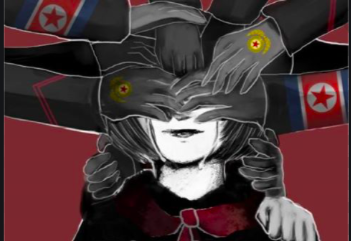
生活総和
(Group criticism sessions)
生活総和は、学校や労働団体で自己批判と相互批判を通じて思想を浸透させ, 独裁政権に服従させるために、金日成の時から受け継がれてき嫌悪教育です。生活総和はお互いを監視し不信させ, 社会の構成員の間で「協力」しないようにするのに大変貢献をしています。
生活総和は相手を常に批判的な視点で見るようにし、そのような環境でお互いを信じることができず, 常に気をつけながら圧迫感を感じるようになります。相互批判は批判することが見つからないときは, 学生同士あらかじめ言うことを決めておいて行う場合も多いが、それでも自分を批判すると心に傷を負います。それだけでなく、相互批判をきっかけに学校で弱い学生をいじめが起こることがとても多いのが現状です。
The Saeng-hwal-chong-hwa or group criticism sessions should be mentioned as it is a form of damaging and fear instilling education, that has been handed down since Kim Il-Sung Government, to make the people obey the dictatorship through public self-criticisms and mutual criticisms at schools or working groups so, it makes people monitor and distrust each other and contribute greatly to preventing members of the society from cooperating with each other.
This practice has become so ingrained in their society that citizens view each other with a critical eye even when not in these sessions. Through this environment of constant societal scrutiny, the regime causes its people to experience mistrust, anxiety, and fear while still suffering pressure to promulgate the very behavior monitoring and censorship which keeps them so subjugated. Moreover, there are considerable cases in which weaker students are bullied because of what happens in Saeng-hwal-chong-hwa.
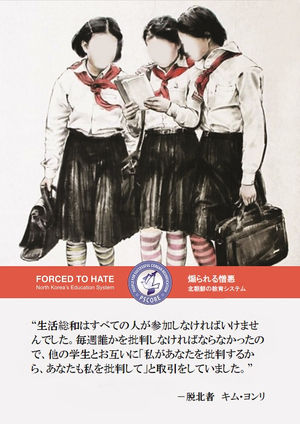
脱北者 キム・ヨンリの証言
Testimony of North Korean defector Kim Young-ri
''Everyone had to participate in the group criticism session. I had to criticize someone every week, so my friends and I would often rearrange in advance saying, "I will criticize you, so you criticize me."- Kim Young-ri
公開処刑参加
(Public executions)
公開処刑は様々な場所で頻繁に行われるため、強制的か否かを問わず、多くの人々が幼い頃から目撃することになります。脱北者の証言にもあるように非常に暴力的であり, 独裁政権に反抗するいかなる行動も容認しないということを知らしめることにが目的です。
公開処刑は恐怖心で北朝鮮を統治しようとする目標の下行われます。公開処刑には強制的に参加しなければならない場合が多く、参加者が未成年の場合、生涯大きなトラウマとして残ります。このような暴力的な場に小学校の生徒にまで強制的に出席するように強制し、人間に対する最低限の尊厳を徹底的に否定して政権に忠誠を誓わなければ「お前も殺すことになる」という脅迫をしているのです。
Because public executions frequently occur in various locations, people witness them since youth, whether they are forced to or not. These executions, as supported by the defectors’ testimonies, are very violent and serve to warn everyone that there is no tolerance for any form of actions made against the regime.
Public executions are conducted to rule North Korea via a reign of terror. There are many moments in which it is mandatory to attend public executions, and if the person attending is a minor, it often becomes a source of lifelong trauma. These scenes of violence, which even elementary school students are forced to watch, are a denial of basic human dignity and humane criminal justice to the people.
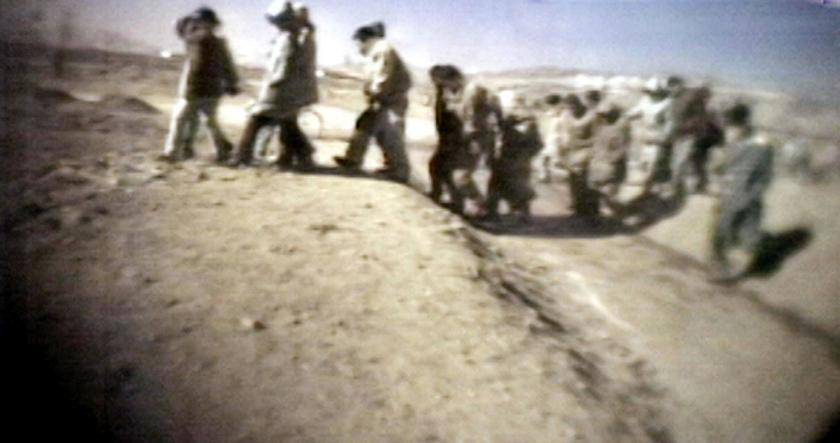
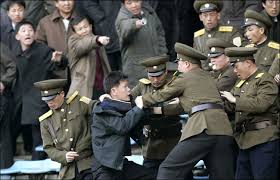
群衆大会
(Rallies)
内部結束力と外勢の憎悪をさらに造成するために北朝鮮政府は群衆大会を執り行います。群衆大会とは人々が集まり「米帝と南朝鮮(韓国)傀儡徒党を打ち砕こう」といった嫌悪発言をしてデモするものです。祝日によく行われ、学級、学校、市、道、 中央政府でスケジュールがすべて異なり、すべての群衆大会に出席しなければならないため、 四六時中ところかまわず行われます。
To create stronger hatred towards foreign powers and to create internal solidarity, North Korea holds mass rallies. Mass rallies are protests in which crowds gather and make hate speeches such as, “Defeat the U.S. and the puppet government of South Korea.” It is held mostly in holidays, but each class, school, city, province, and central government has a different schedule; all must attend to these rallies.
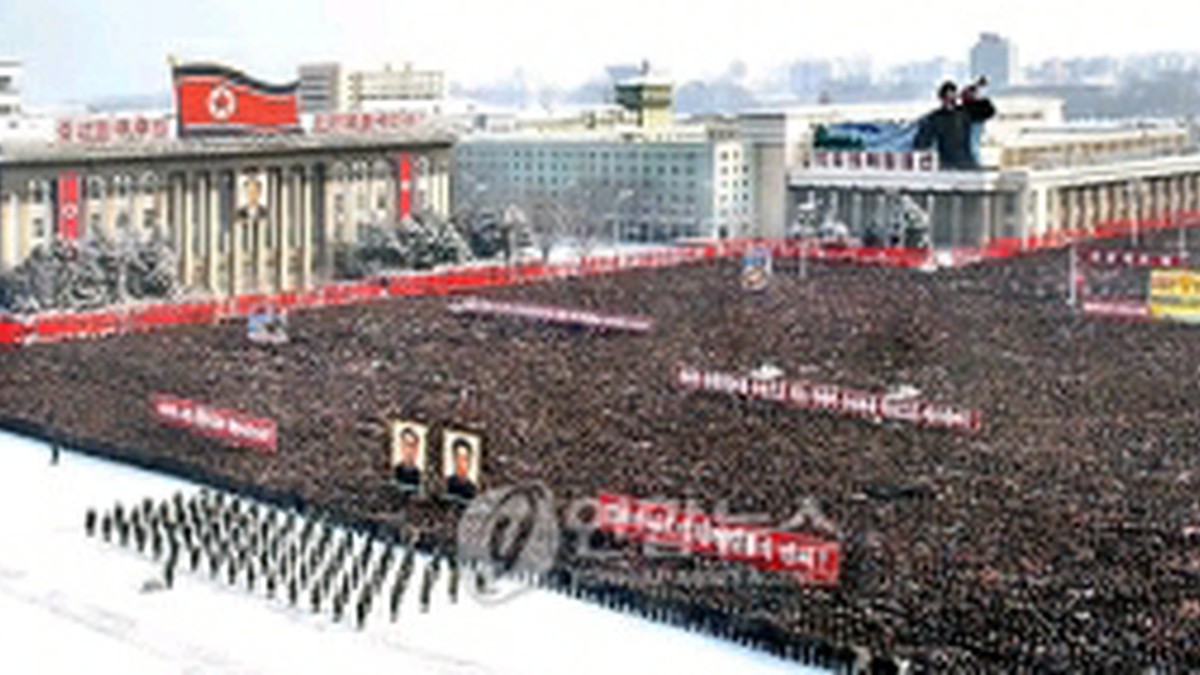
漫画/映画
(Animated movies)
生活総和と群衆大会などの行事だけでなく、日常生活の中でも暴力教育は行われます。北朝鮮政府は成長期の幼い子供たちにアニメを通じて思想を注入することにより、学校内の嫌悪教育に加え、より強力な洗脳をしています。幼い頃からお互いを愛して、お互いを尊重しなさいと言われて育った他の国の子供たちとは違い、北朝鮮の子供たちは常に外勢を憎悪し、牽制するように学ぶのです。このような教育は、北朝鮮の子供たちが最も多く接する漫画にも表れています。 『少年将帥』『リスとハリネズミ』のような北朝鮮のアニメは、常に資本主義国家を憎悪して排斥するように教え、北朝鮮が世界最高だと洗脳させます。
The violent and hateful propaganda takes place not just in events like Saeng-hwal-chong-hwa or rallies but also in their daily lives. The North Korean government indoctrinates the youth by providing animated cartoons that infuse hateful ideas along with their school curriculum. Since youth, North Korean children are taught to loathe and disrespect foreign powers and peoples, which is much different from children in other countries who are told to love and respect one another. These ideals even appear in the popular animated shows for the North Korean children.
There are animated cartoons like “Boy General” or “The Squirrel and the Hedgehog” that teach children to hate and exclude capitalist countries at all times, and at the same time, they indoctrinate the children into believing that North Korea is the best country in the world.
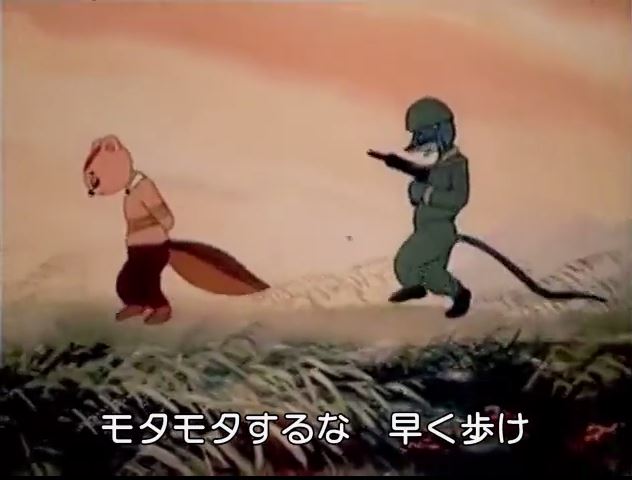
北朝鮮アニメ『リスとネズミ』の一場面
A scene from the North Korean anime ''The Squirrel and the Hedgehog"
’’Don't be slow. Walk fast’’
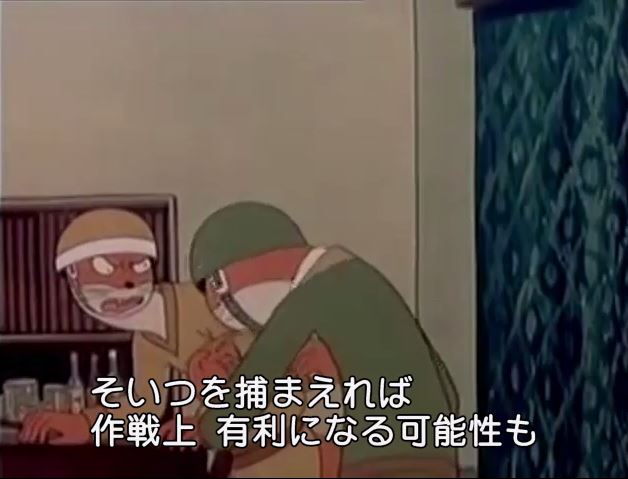
北朝鮮アニメ『リスとネズミ』の一場面
A scene from the North Korean anime ''The Squirrel and the Hedgehog"
''If you catch it, you may have an operational advantage.''
いかがでしたでしょうか?北朝鮮がいかに排他的な国家であり国民の洗脳教育に力を入れているのかが見えてきましたね。次回は「忘れられた被害者たち」についてお伝えしていきます。
それでは次回のブログでお会いしましょう!
私たちのウェブサイトはこちらから▶️http://pscore.org/home-ja/
お読みいただきありがとうございました!
This is the end of today's post. We hope you could see how North Korea is an exclusive nation and is focusing on brainwashing education for the people.
Thank you for reading! :) We'll see you in our next post about ''Forgoten abductees''!
Visit our website too! ▶️http://pscore.org/home/
「憎しみを学ぶ」北朝鮮の教育 (1)-PSCORE [ENG]
皆さんこんにちは!今回も、北朝鮮の教育について詳しくみていきましょう!
Hello everyone! Today let us take a closer look at North Korean education.
すべての科目での偶像化
(Propaganda in other subjects)
指導者の偶像化は政治思想科目だけに留まらず、教科課程全体で行われます。国語の勉強をするにしても、その目的は金日成と金正日に対する忠誠心を鼓舞し、社会主義思想を鼓舞するために限定されており、紀行文を書くにしても遺跡などの歴史的な場所を観光し観察するよりは、金日成の家系の生家や成長した場所などを訪問し、彼らの業績を称賛して崇める内容を書くことが目的です。音楽は大部分が金日成と金正日の歌である。もし偶像化する歌詞を変えて歌ったり、故意に歌を作ると親が代わりに処罰される危険があります。スポーツや芸術の特待生の場合は、運動をするにしても音楽をするにしても目標は常に「将軍様に喜びを捧げよう」なのです。
The idolization method is not only present in political and revolution classes. Even if you’re studying a language, it is limited to content regarding loyalty to Kim Il-Sung and Kim Jong-Il and social thought. The first words you learn are the leader’s names. Even in travel essays, rather than focusing on the tourism and historical aspects of a historical landmark, it focuses on praising and revering the life and achievements of Kim Il-Sung and his family. Music mostly involves songs about Kim Il-Sung and Kim Jong-Il. If one changes the lyrics related to idolization or if the lyrics are neglectfully written, then it’s possible that students’ parents could be punished in the students’ stead. Whether one’s specialty is physical fitness or music, the objective is always “to please the General.”
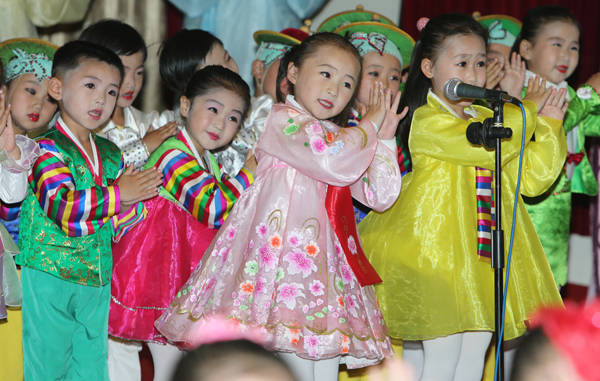
歴史歪曲
(Historical Distortion)
歴史歪曲は偶像化に加え、北朝鮮一党独裁体制を維持させるために行われている洗脳教育です。北朝鮮当局は歴史歪曲を通じて政権を正当化し、指導者を偶像化して北朝鮮が偉大な国家という点を強調しています。歴史歪曲の対象は非常に多様であるが韓国近現代史歪曲、金日成の家系の抗日闘争捏造、金日成家系の神話創造、世界史の意図的に歪曲された解釈など様々な分野で行われています。また資本主義、帝国主義に対する疑いを常に持つようにさせ、外部勢力のいかなる影響も防ごうとしています。
北朝鮮が主張する近現代史では、様々な方面で韓国とアメリカを敵対視し, 独裁政権を正当化し、北朝鮮が偉大な国だと強調する。最も代表的な例として朝鮮戦争は南が攻めてきたため始まり、中国が介入したという事実は全く言及せず、自分たちの力だけで米帝を追い返したかのように述べる。実際には朝鮮戦争は1950年6月25日に当時の南北の境界線であった38度線を北朝鮮が戦車で侵略したため勃発した。
Historical distortion, along with idolization, is part of the indoctrination education system designed to maintain the single-party dictatorship of North Korea. The North Korean government through distorting history justifies the regime, idolizes its leaders, and accentuates its claim that it is a great nation. History is distorted by changing modern Korean history, manipulating truths about Kim Il-Sung’s anti-Japanese war efforts, glorifying the Kim family history as well as intentionally misinterpreting world history. Furthermore, such description is intended as a warning against capitalism and imperialism, calling for a defensive attitude towards foreign influences.
Another example can be found from “The Revolutionary Acts of Our Great Leader, Kim Jong-Il” textbook for middle school which states that the Korean War began with a South Korean attack on North Korea, and that North Korea defeated South Korea and the United States forces without any help from China. But in reality, from the world history which is taught worldwide, the Korean War started on the 25th of June 1950 when North Korean tanks crossed the 38th parallel, the boundary with South Korea.
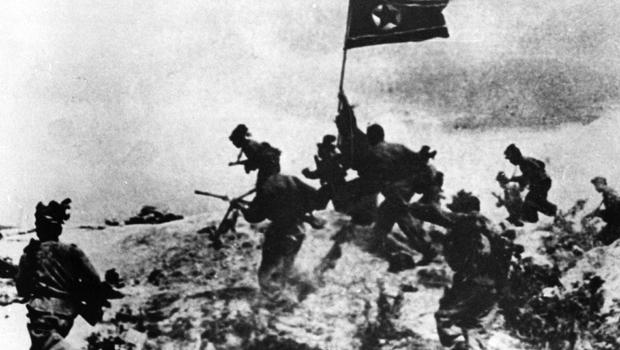
朝鮮戦争 (1950-1953)
Korean War (1950-1953)
暴力と嫌悪教育
(Violent and hateful propaganda)
北朝鮮政府は、独裁体制を維持し内部結束を高めるために暴力と嫌悪教育を行っています。学校での教科及び課外活動、軍隊式教育、公開処刑、歴史博物館訪問、群衆大会、生活総和、日常生活での遊びや漫画、そして革命遺子女教育などがその例です。これらを通して外部の敵を作り、互いに監視させることによって内部結束させ反乱の種を眠らせているのです。
歴史歪曲と同じ方法で北朝鮮は共産主義理念と社会制度を結束するために資本主義を辛辣に批判し反米と反日感情を煽りながら, 同時に資本主義文化と帝国主義の思想と文化を北朝鮮社会から排除する。このような理由から、学校では革命歴史教科を通じて米帝とその協力国に対する嫌悪を煽り、学生に幼い頃から外勢に反感を持たせるための教育をする。例えば、数学の試験には、「米帝タンク何台をぶち壊して何台が残り…」 のような問題を出題し、音楽の時間には「三千里江山に金銀財宝あふれ[… ]悪人倭奴たち この地からで追い出して」といったような歌を歌わせる。
The North Korean government upholds the violent and hateful education policy in order to maintain its dictatorship and inspire integral unity. Such efforts are apparent in various conditions. The school curriculum, a militaristic way of education, public executions, visits to the historic museum, rallies, Saeng-hwal-chong-hwa (criticism/self-evaluation sessions), games and comic books, and revolutionary education are only some of the examples. Through these practices, North Korea intends to make enemies outside the society, unify the nation, and try to avoid political insurrection by having the citizens monitor each other.
In the same context as historical distortion, North Korea criticizes capitalism and uses anti-U.S. and anti-Japanese sentiment in order to encourage communist ideology and the social system. For this reason, North Koreans learn the revolutionary history and activities of their leaders in school, which then fosters feelings of hatred toward the U.S. and its allies. For example, there are questions on math exams such as, “How many are left after destroying some of the American tanks?” and lyrics in music classes, such as “Kick the Japanese out of the country.”
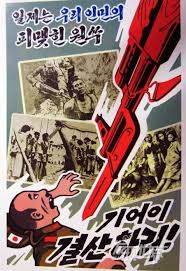
「私たち朝鮮民族の血なまぐさい敵である日本帝国を一度に破壊せよ!」
''Destroy the Japanese Empire, the bloody enemy of our people, once and for all!''
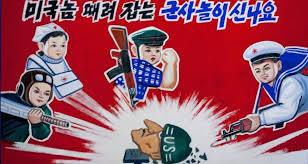
「戦争で米国の野郎どもを叩き潰すのは楽しい」と書かれたプロパガンダ
Propaganda that says "It's fun crushing the American bastards in the war games"
嫌悪教育は学校で行っている正規教科以外の様々な活動でも行われる。学校で主催しているほとんどの運動会には、「ヤンコベンイ(西洋人の鼻や容姿をからかう意味のヤンコと、 名詞にあとにつけてその名詞の特徴をもった人や物を意味するベンイが合わさった言葉)米国野郎を殴り殺す競技」がある。これは小学校に入る前の幼児も参加しなければならない競技で、すべての学生が競技に参加しなければならない。また、特別な場合でない平常時にも暴力的な競技をするのであるが、この時にも米国側が常に負けるように誘導する。これらの暴力的な競技は北朝鮮が世界一であると洗脳すると同時に反米、反帝国主義感情を煽る目的がある。
Hateful propaganda is found in various activities outside of the regular educational curriculum. Almost every field day at school has a competition called, “Smash the foreign-nosed Americans to death”. Most students are required to participate, and they’ve done so since a very young age, as elementary school students. Moreover, they casually play violent games on special occasions, and try to lead whoever is on the American team to lose. The purpose of these kinds of violent games is to indoctrinate the children into believing that North Korea is the best country in the world, and to instill anti-American, anti-imperialist sentiment.
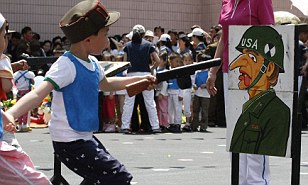
ヤンコベンイ
The game called “Smash the foreign-nosed Americans to death”
「憎しみを学ぶ」北朝鮮の教育(2)もぜひお読みください!
私たちPSCOREのウェブサイトもチェックしてみてくださいね。次回もどうぞお楽しみに!
お読みいただきありがとうございました!
This is the end of today's post. Please look forward to the part 2 post!
Check out our PSCORE website as well. ▶︎http://pscore.org/home/
See you next time! :)
「革命家を育てる」北朝鮮の教育-PSCORE [ENG]
皆さんこんにちは!今日は北朝鮮の革命家教育について詳しくお伝えします。
Hello everyone! Today we would like to tell you about the educational system in North Korea based on revolutionary ideals.
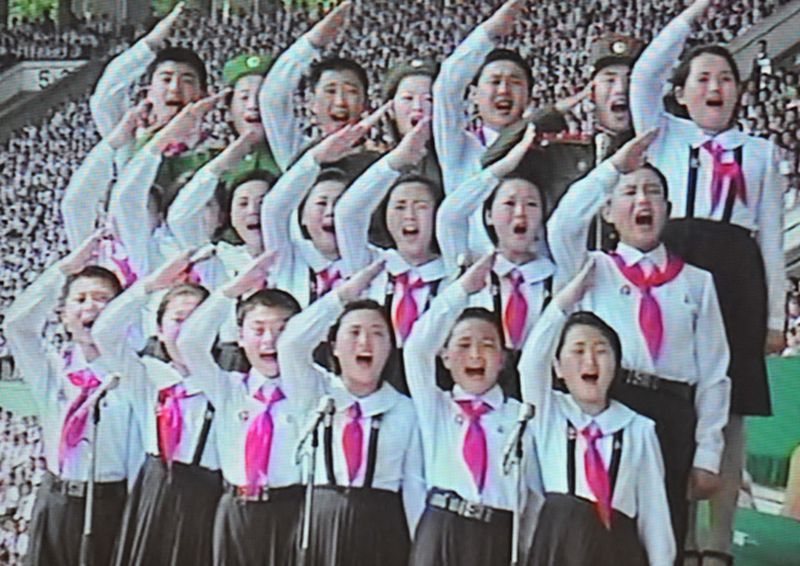
北朝鮮少年団
Korean's Children Union
北朝鮮の教育方針
(Education policy in North Korea)
“国家は社会主義教育学の原理を具現して後代を社会と人民のために闘争する不屈の革命家として、智徳体を備えた主体型の新しい人間に育てる”
と明示されています。
北朝鮮で使われる”革命”は、他の国で一般的に使われる”革命”の意味と異なります。北朝鮮の”革命”は、国が必要とするならばいかなる犠牲を払ってでも自らを捧げて闘争することであり、国家に必要なものと金日成一家の独裁に必要なものは同一だと考えることなのです。
北朝鮮の教育は、北朝鮮の住民の人間性を抹殺し、お互いを監視させ、外部の人々と外部の国を憎悪するよう洗脳することに重きを置いています。また、北朝鮮の子供や青少年は、正常な教育を受けるべき重要な時期に、実用性のない革命教育と多岐にわたる労働と物品収集に強制的に動員されるのです。
Article 43 of the North Korean constitution states that “the State shall embody the principles of socialist pedagogy so as to raise the rising generation to be steadfast revolutionaries who will fight for society and the people, to be people of the new Juche type who are acknowledgeable, morally sound and physically healthy”.
In this context, the “revolution” that North Korea has mentioned means sacrificing everything for the sake of the country, more precisely the dictatorship regime, and becoming loyal to the Kim family.
North Korean education focuses on eradicating the humanity of North Koreans, monitoring each other, and brainwashing them to hate outsiders. Also, North Korean children and adolescents are forced to mobilize for impractical revolutionary education and a wide range of labor and goods collection at critical times when they should have a normal education.
偶像化教育
(Idolization Propaganda)
北朝鮮では、1970年代から偶像化教育を通して指導者に対する無条件的な服従をさせています。北朝鮮の住民は偶像化教育を非常に幼い時から受けるます。小学校と中学校では金日成の家系の偶像化の内容が正規科目に含まれるのです。具体的には、金日成、金正日と彼の生母金正淑、いわゆる「白頭山3大将軍」の偉大さを強調する「幼少期」や「革命活動」のような教科を教えます。(白頭山-朝鮮民族の聖地とされる山)
Since the 1970s, Kim Il-Sung has demanded absolute obedience from the public through idolization education. North Korean people receive idolization education from a very young age. In elementary and junior high schools, the content of idolization of Kim Il Sung's family is included in the regular subjects. As part of the curriculum, the courses are about the childhoods and revolutionary activities of Kim Il-Sung, Kim Jong-Il, and his birth mother, Kim Jong-Suk, all the while emphasizing the greatness of “the 3 Generations of Baekdu Mountain’s Leaders.” (Mt. Baekdu- A mountain considered to be a sacred place for the Korean race)
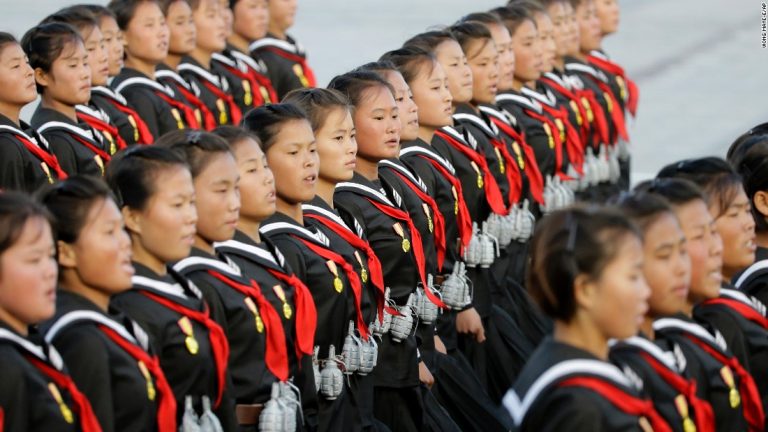
授業前(Before class)
北朝鮮の学生は毎日学校の授業が始まる前に15分程度偶像化関連の内容を声に出して読み, 勉強しなければなりません。この時間を「独歩時間」と呼びます。 これは1日の最初の日課で、学生のうち1人が政治思想が掲載された新聞をはじめ、教養資料や歌を声に出して読むのです。これには党の政策と時事問題などを学ぶ目的があります。しかし言論の自由が保障されていない北朝鮮では偶像化の目的のための媒体に過ぎません。本質的に独歩時間は独裁者に対する忠誠心を高めるために活用されます。
In North Korea, there is a so-call “self-study” session every day before classes commence where students must spend 15 minutes studying and reading idolization content aloud. One student will bring forth the newspaper or a song and read it for the rest of the class. The objective is to keep learning the Party’s policies and current events. However, with no freedom of the press, the media is merely another form of idolization education. Fundamentally, the Self-Study sessions are intended to foster loyalty towards the dictatorship.
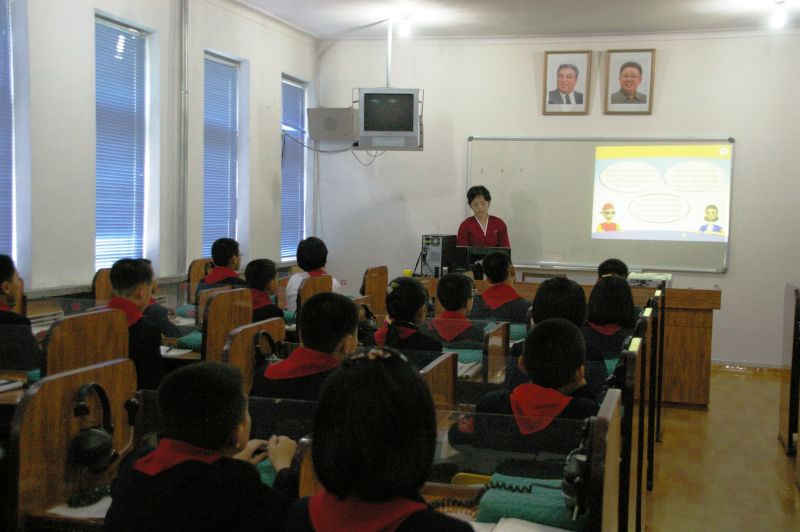
Portraits of Kim Il Sung and Kim Jong Il are displayed in each classroom
授業中(During class)
「金日成の言葉を誤って引用したり、間違っていれば罰を受けた。助詞1つ間違えてもいけなかった。」 – イ・ソンリ
政治思想教科はすべての北朝鮮の教育課程に含まれており、「自主性と創造性を持った共産主義的革命人材」養成のための媒介体として活発に活用されます。北朝鮮の主体思想は指導者に対する無条件的な服従を要求します。その理由は首領のみが北朝鮮の人民たちを歴史的主体へと導いてくれる原動力になるからです。
-北朝鮮独自の政治思想。大衆を革命・建設の主人公としながら、民族の自主性を維持するために人民は絶対的権威を持つ指導者に服従しなければならないと唱える。(小学館『デジタル大辞泉』)
北朝鮮の学生は政治思想科目を必ず勉強しなければならず、政治思想科目の宿題をしなかったり、正しく暗記していなかったりすると深刻な体罰が行われます。このように全学年を通して行われる政治思想教育は北朝鮮の人々に大きな影響を与えています。いわゆる「ゆりかごから墓場まで」抱いて行く政治思想教育のため、多くの北朝鮮人が政治思想教育の重要性を実際より高く評価する。
"I was punished if I mistakenly quoted Kim Il Sung's words. I couldn't even make a mistake in just one particle." – Lee Sung-ri
Political ideology curriculum is pervasive in all aspects of North Korea’s educational curriculum, and it is used strongly as a medium to train “talented revolutionaries with independence and creativity.” North Korea’s Juche ideology demands absolute obedience to the North Korean leaders. This is because according to the ideology, only the leader can be the driving force behind carrying the North Korean people throughout history.
What is the Juche Ideology?
-North Korea's unique political thought. While making the masses the protagonists of revolution and construction, the people must submit to leaders with absolute authority in order to maintain national autonomy. (Shogakukan "Digital Daijisen")
North Korean students are forced to study political thought, and if they do not do their homework in such classes or otherwise fail to correctly memorize the material, they are subjected to harsh physical punishments. This kind of political thought education during the academic years greatly influences the North Korean people. Because the political education is to be carried from the womb to the grave, many individuals consider its importance to be far greater than it actually is.
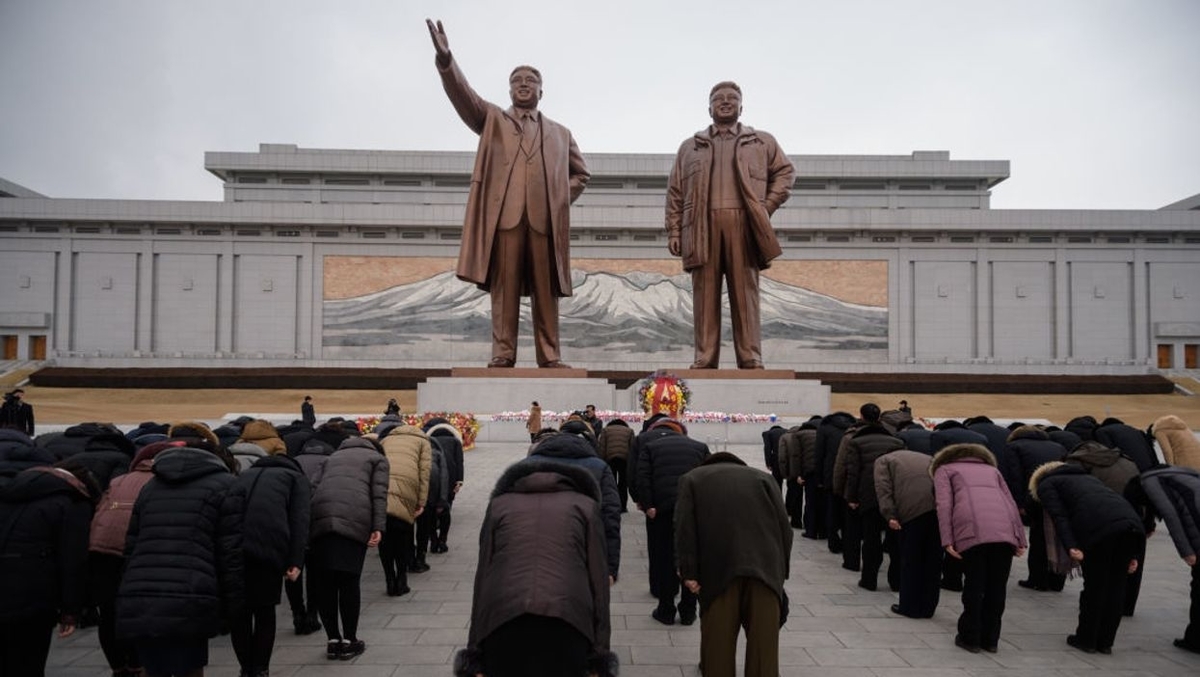
授業外 (Outside classes)
授業外では、日常で常に見ることができる指導者の象徴物(肖像画、バッジ、銅像など)を通じて指導者の偉大さを刻ませます。例えば、北朝鮮全域には約38,000個の銅像があります。
また、彼らの肖像画がいかに重要なものであるかを、幼い頃から「肖像画磨き」を通して学校で教える。 「肖像画磨き」とは、小学校の時から大学まで, 肖像画を精誠をこめて磨くことである。丁寧に肖像画を掃除することは、金日成の家系の無条件的な忠誠心と偶像化を表現する。これだけでなく北朝鮮の政府は住民を継続的に「プロパガンダ」に露出させ、北朝鮮政府思想と正当性を北朝鮮住民に毎日刻みこませます。
Idolization education persists outside classes even on school excursions. Many symbols of the North Korean leaders are created (statues, badges, portraits, etc.) to affirm their greatness to the people; there are approximately 38,000 statues which all have a significant meaning. Schools teach children from a young age that the portraits of the leaders are important by having them clean the portraits. Students are expected to clean the portraits with utmost sincerity from elementary school to college. The act of cleaning the portraits is to have the students express absolute loyalty and idolization towards Kim Il-Sung and his family. Not only this, but the North Korean government exposes its citizens to daily, continuous propaganda revolving around the government’s ideals and legitimacy.
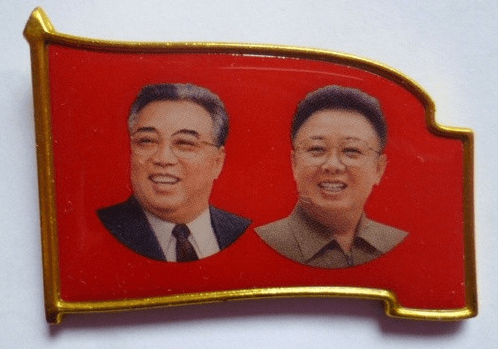
忠誠を表すバッジ
Badge for loyalty
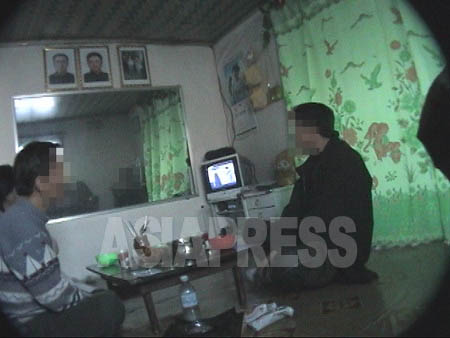
もちろん一般住宅にも肖像画が
Portraits in a general household
いかがでしたでしょうか?次回は「憎しみを学ぶ」北朝鮮の教育をお届けします。
次回もお楽しみに!お読みいただきありがとうございました。
私たちのホームページはこちらから▶️http://pscore.org/home-ja/
Next time, we will talk about North Korean education that forces the people to "learn hatred."
Visit our website ▶️http://pscore.org/home/
Thank you for reading! See you next time :)
(脱北者 実録映像)北朝鮮の児童労働搾取-PSCORE [ENG]
こんにちは!今回は、北朝鮮で現在も続く児童の労働搾取についてお伝えします。
Hello! Today we would like to tell you about the ongoing labor exploitation of children in North Korea.
北朝鮮では児童の労働の搾取が組織的に行われ続けています。鉄道の修理や物質回収、農作業などを始めとする過酷な労働を強制されます。北朝鮮の子ども達が洗脳され搾取される実態を、脱北者自らの実体験と共にインタビュー形式でお伝えします。
Under the Kim regime, the exploitation of child labor continues to be systematically carried out in North Korea. We will tell you about the actual situation of North Korean children being brainwashed and exploited in an interview format along with their own life experiences.
幼い頃から北朝鮮の教育制度の下で子供たちは強制労働を強いられています。強制労働には農村動員、物品収集、建設事業などが含まれます。収容所と孤児院の子どもたちも辛い労働の対象となっています。
農村動員は学校の教科過程に不可欠な要素であると見なされるため、特に報酬が支給されることはありません。農村動員と物品収集のほかにも学生たちは建設事業と金日成、金正日、金正恩の生誕祝賀行事など様々な公演や特別行事などにも動員されます。
From an early age, children are forced into labor under the North Korean education system. Forced labor includes rural mobilization (mandatory farm labor), goods collection, and construction projects. Children in camps, orphanages are also subject to hard work.
Farm labor is considered an integral part of the school's subject process so it is not particularly paid. In addition to farm labor and collecting goods, students are also mobilized for various performances and special events such as construction projects and Kim Il Sung, Kim Jong Il, and Kim Jong Un's birthday celebration.
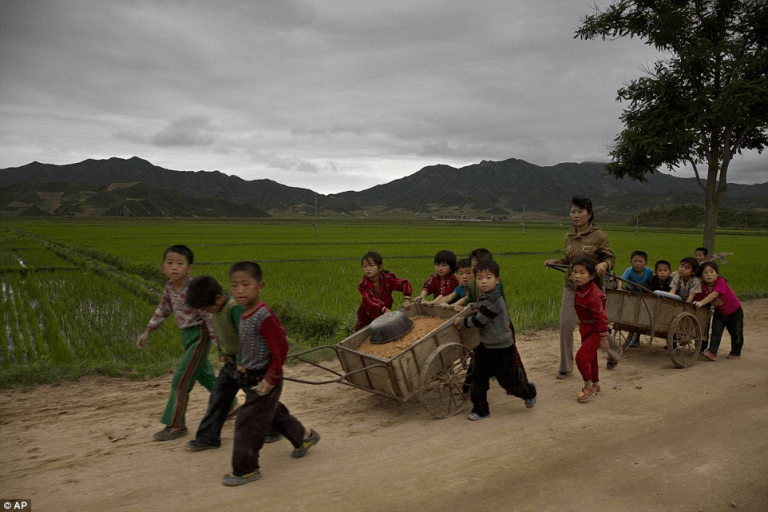
政府が学生たちに物品収集を命令するため、子供たちは抑圧的で強制的な児童労働の負担から逃れることができません。収集量を達成することも難しいのに、入手することすら困難な物品の収集まで要求されるため、学生の負担が余計に増えてしまいます。鉄くずなどの物品がその例です。ただでさえ北朝鮮で手に入れることが難しい鉄くずを10kg以上集めるのは絶対に不可能です。
The government forces students to collect an array of items, some of which are nearly impossible to be found in North Korea. For example, no one can find a piece of scrap iron, let alone over 10 kg, because there is almost no scrap iron in North Korea.
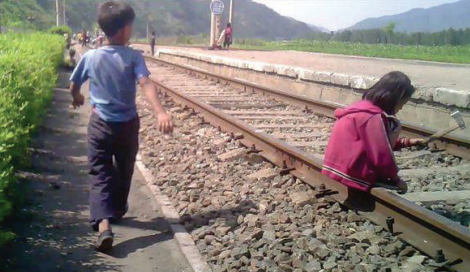
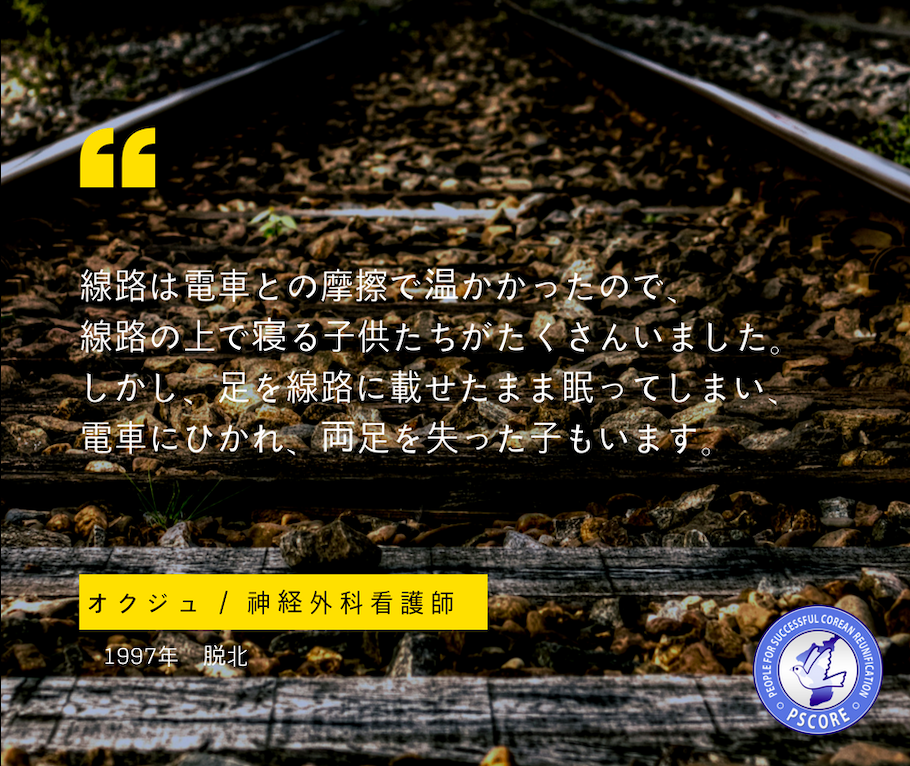
''The railroad tracks were warm due to friction with the train, so there were many children sleeping on the railroad tracks. However, some children who fell asleep with their feet on the railroad tracks were hit by a train, and lost both feet.''-Okju (escaped in 1997)
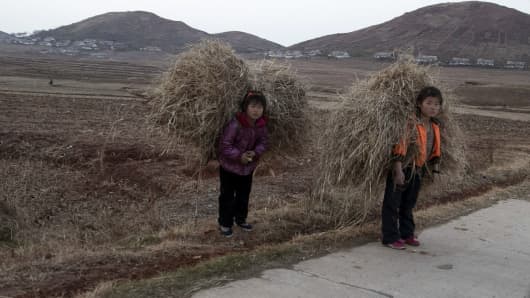
児童の収容施設
(Children in prisons)
北朝鮮政府は収容所の存在を完全に否定していますが、存在が知られている北朝鮮の政治犯収容所は5箇所あります。現在12万人もの人々が政治犯収容所に監禁されていると推定されていますが、受刑者のほとんどは自分が捕まった理由を知りません。
Although the North Korean government completely denies the existence of camps, there are five known North Korean political prisoner camps in the country. It is estimated that as many as 120,000 people are currently held captive in political prison camps, but most prisoners do not know why they were arrested.
収容所に収監された子供たちは暴行と暴言から逃れることはできません。子供たちは人生のほとんどを電気鉄条網に塞がれた息苦しいところに閉じ込められて生活し, ここが本当に良いところだと教えられます。子どもたちは奴隷生活同然の虐待と厳しい労働に苦しめられ、家畜と同様の待遇を受けます。時折監督者が気分が悪い場合には小さなミス1つで子供たちに暴行を加えることもあります。子供たちを罰するのは監督者だけではありません。失敗した責任は児童リーダーに転嫁されます。通常監督者がリーダーを殴ったあと、他の子供たちを殴らせます。
The children in prison camps are physically and verbally punished. The children in prison camps spend the majority of their lives confined within electric fences and are taught to believe that where they are is the best place to live. The cruel treatment and excessive labor are close to slavery and the prisoners are treated like animals. Sometimes, without any reason, the supervisor beats the children over small mistakes. But the supervisor is not the only one to discipline the children. The responsibility is instead passed on to a subordinate, the leader student. Usually, the supervisor beats the leader student and makes him beat the other children.
収容所の中は学校がいくつか入るほどの大きさです。教育も提供されますが質は一般社会で提供される教育の質よりもはるかに低いです。子供たちは基礎的な教育を終えると十分に学習したものとみなされすぐに労働の現場に送り出されます。
特に若者たちは特に残酷な扱いを受けますが、収容所の管理者は青年たちが不可欠な労働力であることを認識しているがゆえに殺しはしないといいます。収容所の子供たちは空腹に苦しんでいるにも関わらず、目を覚ましているほとんどの時間にありとあらゆる労働を強要されます。
The prison camps are large enough to have several schools. Education is also provided, but the quality is much lower than that provided by the general schools. As soon as the children have a rudimentary education, they are deemed ready and immediately sent to the coal mine or workplace.
Young people are treated particularly cruelly, but camp managers do not kill them because they recognize that they are an essential workforce. Children in the camp are forced to do all sorts of work most of the time they are awake, even though they are hungry.
集団体操 (マスゲーム)
(Mass game)
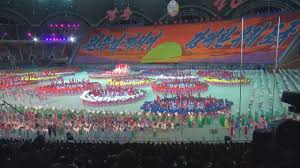
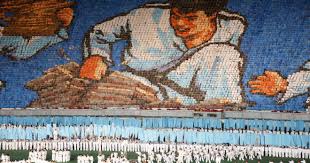
集団体操とも呼ばれるマスゲームは多くの人材が動員される公演です。最も有名な北朝鮮のマスゲームとしては, 大集団体操と芸術公演アリランです。祝祭の見どころの1つは巨大な人間モザイクでパノラマ、スローガン、アニメーションを作り出すマスゲームです。
約5万人の子供たちが色のついたカードを同時に裏返しアニメーションの背景を作るのですが、これらの作業は子供たちにはあまりにも過酷であり、練習は半年から1年かかります。真夏の炎天下の中練習していて死んでしまう子供たちも多いです。金日成、金正日、金正恩の生誕祝賀行事には全国各地で数多くの公演、記念パレード、史跡訪問、歌と合唱団による公演などが行われます。北朝鮮の子供たちはこれらのイベントにも例外なく動員されます。
北朝鮮政府は学校を通じて様々な政治的キャンペーンと行事にも定期的に子供たちを動員します。子供たちはほとんどの祝日と各種記念行事に動員され、数時間にわたり韓国の大統領を侮辱する政治スローガンを叫びながら行進します。
The mass games in North Korea are known to require a lot of manpower. During the Arirang festival, about 50,000 children turn color cards at the same time to create an “animated” mosaic-like background. For Arirang performances especially, children practice tirelessly for 6-12 months. Casualties are inevitable when they practice for hours under the scorching sun.
Children are usually summoned for the celebration of the birthdays of Kim Il-Sung, Kim Jong-Il, and Kim Jong-Un with numerous individual performances across the nation, ceremonial parades, visits to monuments, songs, and choir concerts.
The North Korean government in addition regularly assembles children through the school system for political campaigns and events. They are mobilized to march with posters and shout profane slogans for hours.
次回は、北朝鮮の教育事情についてお伝えします。私たちPSCOREのウェブサイトもチェックしてみてくださいね。次回もどうぞお楽しみに!
お読みいただきありがとうございました!
This is the end of today's post. We hope you learned more about the harsh life of North Koreans. Next time, we will introduce North Korea's education system, so please look forward to it!
Check out our PSCORE website as well. ▶︎http://pscore.org/home/
Thank you for reading! See you next time!:)
『愛の不時着』で話題・北朝鮮のインターネット事情とは?-PSCORE [ENG]
皆さんこんにちは!今回は北朝鮮でのインターネット環境についてお伝えしていきます。
「北朝鮮って携帯使えるの?」「海外ドラマとか観ちゃダメなんじゃないの?」...など、皆さんの疑問にお答えしていきますので最後までお読みくださいね!
Hello everyone! Today we will tell you about the Internet environment in North Korea.
We will answer your questions such as "Can North Koreas use mobile phones?" "Isn't it prohibited to watch overseas dramas?" Please read it to the end!

❓北朝鮮では携帯・インターネットは使えるの❓
(Is the use of Mobile / Internet allowed in North Korea?)
A. 基本的には使えません。政府が利用を厳しく統制しているためです。
A. Basically, it is not allowed. This is because the government strictly controls its use.
携帯電話やインターネットを使えば、世界中の情報が得られます。北朝鮮では国内で承認されていない海外コンテンツや技術はすべて違法であり、一般の人々が手に入れられるのは検閲された情報やニュースなどごくわずかです。 北朝鮮政府にとっては、政権維持のために海外の文化やニュースへのアクセスを可能な限り管理および制限することが最も重要なのです。
Mobile phones and the Internet allow you to get information from all around the world. In North Korea, all foreign content and technology that are not approved by the government are illegal, and the general public has very little information or news that is censored. It is of utmost importance for the North Korean government to control and limit access to foreign cultures and news as much as possible in order to maintain its regime.
インターネットにアクセスできるのはごく限られた富裕層 (政府高官などのハイパーエリート階級もしくはエリート学生など)です。北朝鮮人口の大多数を占める一般人がインターネットへのアクセスを行うのを厳しく規制するために、政府はテクノロジーを活用して監視を強化しています。
Only a limited number of wealthy people (such as hyper-elite classes like government officials or elite students) have access to the Internet. To strictly regulate access to the Internet by the general public, who make up the majority of North Korea's population, the government is using technology to strengthen surveillance.
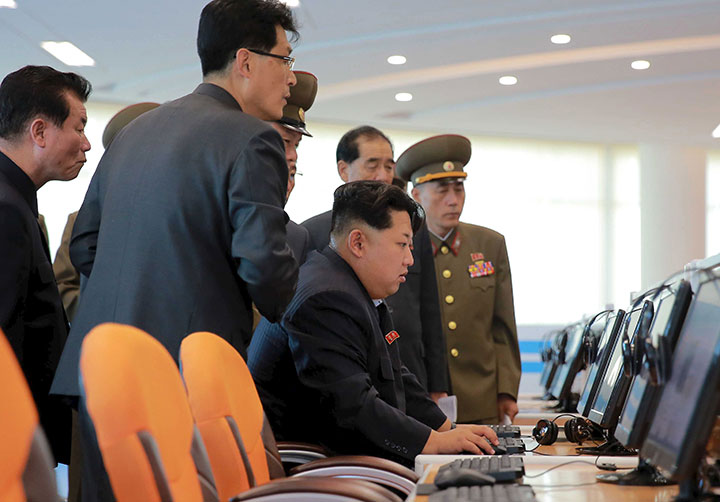

『愛の不時着』ソ・ダンもデパート社長令嬢
Seo Dan from "Crash Landing on You" is also the daughter of the president of a department store
政府は北朝鮮製のソフトウェアを使って携帯電話やコンピューターの所有者に関するデータを収集しています。例えば、Red Star OSというソフトウェアは、北朝鮮で作成されたノート型パソコンやタブレットなどの多くのデバイスにインストールされています。政府はRed StarOSを介して接続されたすべてのデバイスのデータにアクセスできます。Red Star OSを使用すると、政府は各USBおよびSDカードが以前に接続されたすべてのデバイスを追跡することもできます。一方で、密輸などを通して海外製のデバイスを所持する人もいます。つまり、北朝鮮人は違法な海外のデバイスを所有するリスクを負うか、合法な北朝鮮製の装置を使うことによってのプライバシーの欠如を受け入れるかのどちらかを選択することを余儀なくされているのです。
The government uses North Korean-made software to collect data about owners of mobile phones and computers. For example, software called Red Star OS is installed on many devices such as laptops and tablets made in North Korea. Governments can access data on all devices connected through Red Star OS. It also allows governments to track all devices to which each USB and SD card was previously connected. On the other hand, some people have devices made overseas through smuggling. This means that North Koreans are forced to choose between taking the risk of owning an illegal foreign device or accepting the lack of privacy by using legitimate North Korean products.
「国民が自由にインターネットが使えるようになれば、北朝鮮は自国を維持することは難しいでしょう。 [...]ほとんどの人の思想は変わり、社会は混乱し、人々は裏切られたと感じるでしょう。それが実現するかは時間の問題で、誰もが変わる時が来るのです。 [...]海外に住む北朝鮮人は真実を知っています。 [...]インターネットは北朝鮮人の脱北に大きな役割を果たしています。 人々が一度でもインターネットを使うならば、彼らはすべてを知ることになります。」 –キム・ヨンリ (脱北者)
“If the internet worked, it would be difficult to maintain North Korea. [...] It would be a mess, for most people their thoughts will change. They will feel betrayed, it is just a matter of time, everyone will change. [...] North Koreans who live abroad know the truth. [...] The internet plays a major role in the defection of North Koreans. If they use it even once, they find out everything. ”– Kim Yeon- Ri (North Korean defector)
しかし、近年では状況が急激に変化しています。
2012年から2018年の間に韓国に亡命した200人の北朝鮮人を対象とした調査では、脱北者のうちの46%が北朝鮮で携帯電話を所有していたことがわかっています。ここで、重要なポイントが2つあります。
第一に、脱北を実行できる人は、携帯電話を所有するなどの違法行為の危険を冒す可能性が高く、そうする手段ももっている人です。第二に、脱北者の出身地の割合が最も高かったのは北朝鮮と中国の国境沿いで、携帯電話を密輸して使用するのが比較的簡単です。このように、政府の極端な統制にもかかわらず携帯電話とインターネットへのアクセスが可能な人は一定数いるのです。
However, the situation has changed drastically in recent years.
A survey of 200 North Koreans who escaped to South Korea between 2012 and 2018 found that 46% of them owned mobile phones in North Korea. There are two important points here.
First, those who can defect from the North are likely to take the risk of illegal actions, such as owning a mobile phone, and have the means to do so. Second, the highest percentage of North Korean defectors came from along the border between North Korea and China, where it is relatively easy to smuggle and use mobile phones. As you can see, there are a certain number of people who have access to mobile phones and the Internet despite the extreme control of the government.

朝中国境の丹東で入手できる北朝鮮の携帯電話 [Pyongyang T6]
North Korean mobile phone 'Pyongyang T6' available in Dandong on the NK-China border
❓海外コンテンツへのアクセスがバレたらどうなるの❓
(What happens if you get caught accessing overseas content?)
金正恩が政権を握って以来、処罰はますます厳しくなりました。海外ドラマを見ただけで処刑されることは珍しくないのです。
金正恩の下では、学校や事務所などの公共の場や人々の家でも当局の踏み込み捜査が頻繁に行われています。 捜査は、USB、SDカード、海外コンテンツを含むDVDなどの違法なデバイスに対して行われます。もし見つかって賄賂を渡すことができない場合、厳しい罰が科せられる可能性があります。
「ある日お気に入りのCDを友人に勧めました。 しかし、その友人が自宅でそのCDを聞いていた時、突然踏み込み捜査が行われたのです。彼らはCDが誰のものかと尋ねました。こうして、私と友人、そして私たちの家族までもが捕まったのです。」 –キム・ボラム
The punishment has become more severe since Kim Jong Un came to power. It is not uncommon to be executed just by watching an overseas drama.
Under Kim Jong Un, authorities are frequently conducting in-depth investigations in public places such as schools and offices and in people's homes. The investigation is conducted on illegal devices such as USB, SD cards and DVDs containing foreign content. If found and unable to bribe, severe penalties can be imposed.
“I watched something on a CD and thought it was fun, so I recommended it to my friend. My friend was watching it at his/her house when they suddenly got inspected. They asked who the CD belonged to, and that’s how we got caught, my friend’s family and mine as well.” – Kim Bo Ram
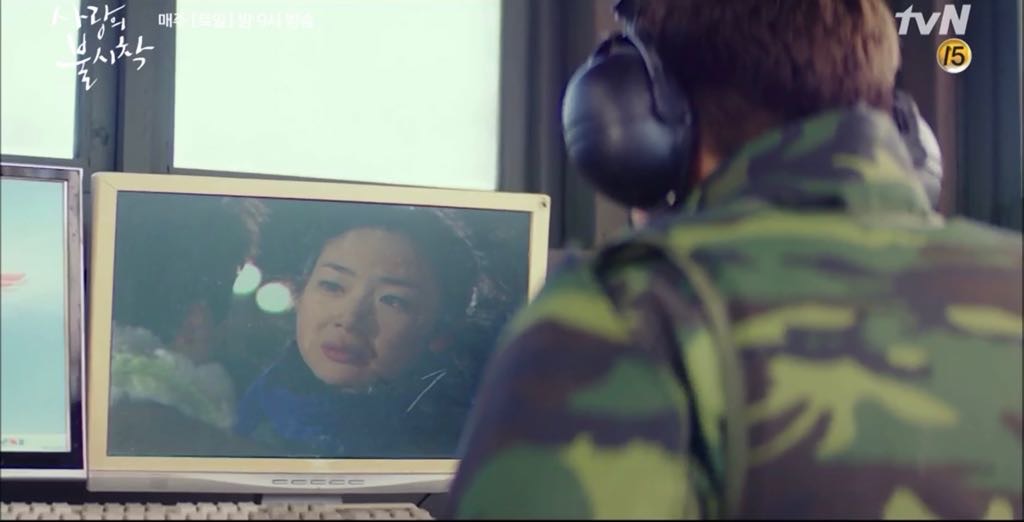
『愛の不時着』韓ドラ通の北朝鮮兵士 キム・ジュモク
Kim Jumok from "Crash Landing on You," a North Korean soldier who loves K-dramas
いかがでしたでしょうか?政府の必死の努力にも関わらず、インターネットや海外コンテンツへのアクセスは近年広まりつつあるようですね。
次回は、児童労働についてお伝えします。私たちPSCOREのウェブサイトもチェックしてみてくださいね。次回もどうぞお楽しみに!
お読みいただきありがとうございました!
This is the end of today's post. We hope you learned more about the harsh life of North Koreans, which was not depicted in the drama "Crash Landing on You."
Next time, we will introduce child labor issue in North Korea, so please look forward to it! Check out our PSCORE website as well.
Thank you for reading! See you next time!:)
『愛の不時着』で話題・北朝鮮住民の知られざる生活実態とは?(2)-PSCORE [ENG]
こんにちは!今日も北朝鮮住民の知られざる生活実態についてご紹介していきます。
Hello! Continuing from the last post, we would like to introduce the real living conditions of North Korean people.
(Propaganda)
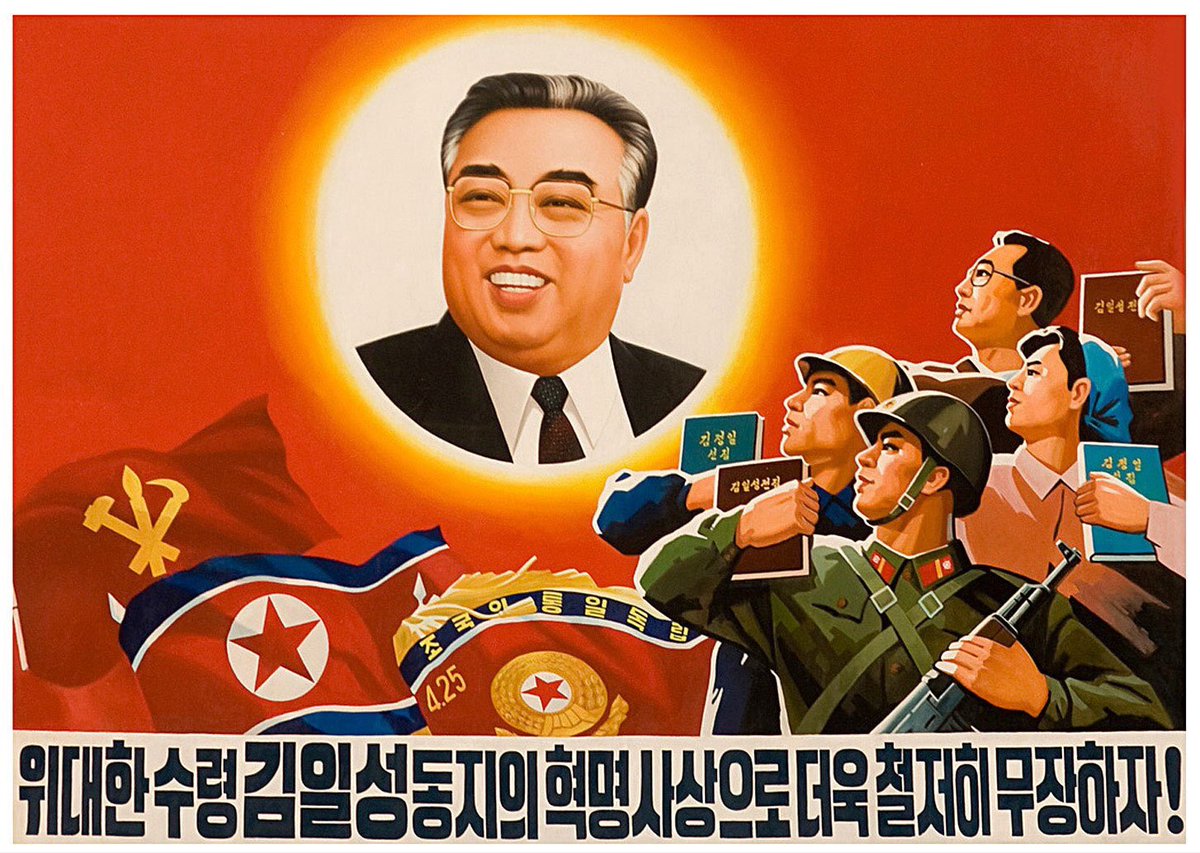
ドラマ『愛の不時着』でも、北朝鮮の至る所にプロパガンダ が登場していましたよね。
北朝鮮の住民は子供の頃から金日成の家系を偶像化し、祖国のために命を捧げて戦わなければならないと学びます。 北朝鮮の教育過程 はこれを教えるために存在します。
プロパガンダは至る所にあり、映画、テレビ番組、劇場、漫画、街のポスターなど生活のすべての面で目にすることになります。北朝鮮の住民たちは月に数回、金日成、金正日記念碑を訪問しなければならず、“親愛なる指導者” の写真が入った額縁を家に飾り、毎日きれいに拭きます。
Propaganda appeared everywhere in North Korea in the drama "Crash Landing on You."
North Koreans are taught to idolize the Kim family and fight for their country from an early age. The education system is designed around this purpose.
Propaganda is at every corner, and in every aspect of one’s life : movies, television shows, theater, comic books, posters in the street… North Koreans are required to visit monuments to honor Kim Il-Sung and Kim Jong-Il several times a month and have framed pictures of their “beloved leaders” in their homes that they are required to clean every day.
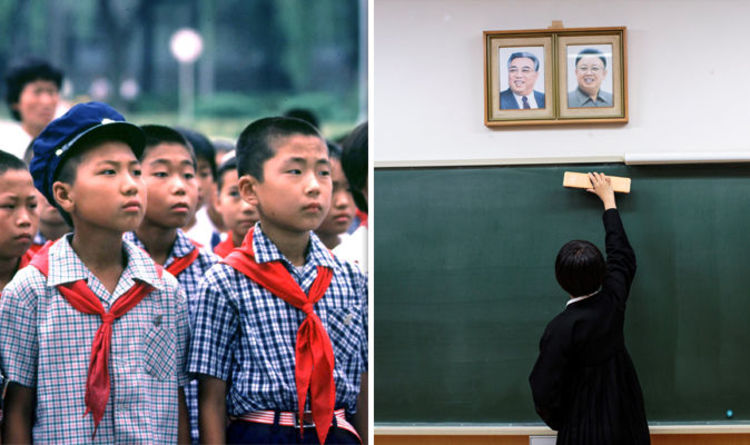
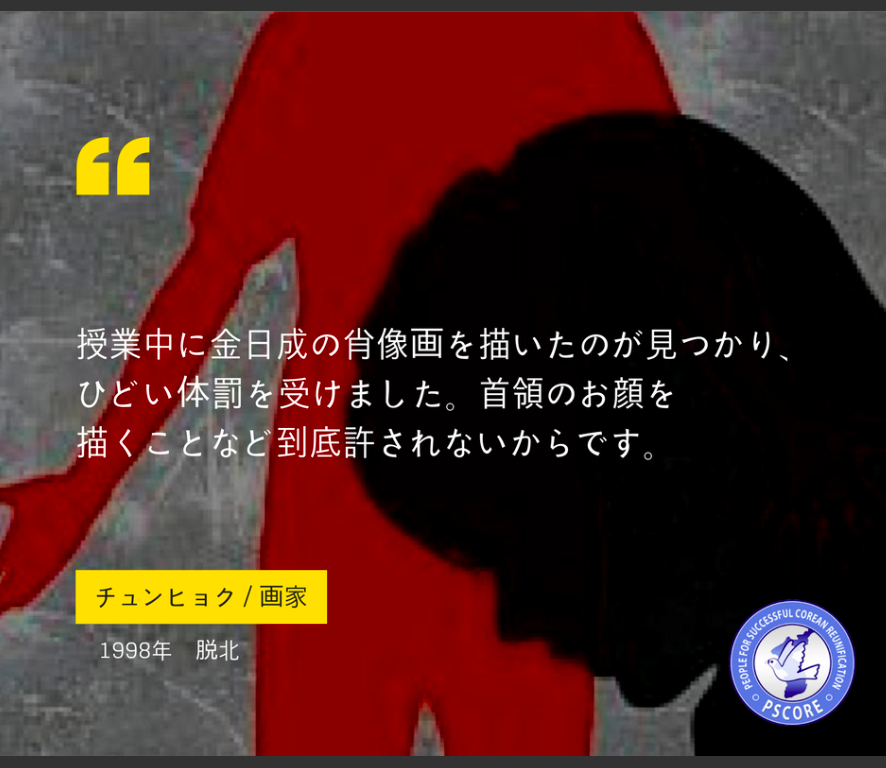
''I was found to have painted a portrait of Kim Il Sung during class and suffered severe corporal punishment. It is absolutely unacceptable to draw the face of the leader.''-Chun Hyuk (escaped in 1998)
強制労働
(Forced labor)
ほとんどの住民は、高校を卒業した後大学に進学することができる身分とお金がないため、集団農場、工場、建設現場などに動員されます。彼らは仕事を選択する権利さえ与えられず、1日に12時間から16時間にも及ぶ厳しい労働を強いられています。
As most of them don’t have the background and money sufficient to go to university after they graduate from high school, North Koreans are sent to work on collective farms, factories, construction sites, etc. They do not get to choose their job and are submitted to intense hours of work, up to 12 or 16 hours per day.

''I had weak joints, but I was assigned to a factory where I was forced to stand for a day. After six years, I was hospitalized with completely broken joints in my both legs and was able to rest for the first time in my life.'' -Ayong (escaped in 2009)
労働の対価である給料と食糧はほとんどもらえません。例えば、集団農場では各労働者に1日のノルマを与えますが、ノルマを満たせない場合は労働者は食べ物をもらうことができません。建設現場や鉱山で働くには危険が伴いますが、たとえ怪我をしても負傷に対するいかなる補償も受けることができないのです。
In exchange for their work, they receive little pay and food. In collective farms, for instance, each worker is given a quota per day, and when the quota is not met, the worker does not get anything to eat. Working on construction sites and in mines can be dangerous, but if injured, the North Koreans do not receive any compensation.
いかがでしたでしょうか?ドラマ『愛の不時着』では描かれなかった北朝鮮人の過酷な生活実態が見えてきたと思います。
次回は、北朝鮮国内でのインターネット環境についてご紹介します。私たちPSCOREのウェブサイトもチェックしてみてくださいね。次回もどうぞお楽しみに!
お読みいただきありがとうございました!
This is the end of today's post. We hope you learned more about the harsh life of North Koreans, which was not depicted in the drama "Crash Landing on You."
Next time, we will introduce the Internet environment in North Korea, so please look forward to it! Check out our PSCORE website as well.
Thank you for reading! See you next time!:)
『愛の不時着』で話題・北朝鮮住民の知られざる生活実態とは?(1)-PSCORE [ENG]
こんにちは!私たちは北朝鮮の人権と真実をお伝えする韓国のNGO団体PSCOREです。
今回は、北朝鮮の住民の知られざる生活実態についてご紹介します。
Hello! We are PSCORE, an international human rights NGO based in Seoul, South Korea. This time, we would like to introduce the real living conditions of North Korean residents that you probably may not know.
昨今の日本では、北朝鮮のエリート軍人と韓国の財閥令嬢の恋を軸に展開する韓国ドラマ『愛の不時着』ブームが巻き起こっていますね。2020年には「ユーキャン新語・流行語大賞」を受賞したほど。皆さんもご覧になりましたか?
Recently in Japan, there is a boom in the South Korean drama "Crash Landing on You," which is a love story between a North Korean elite soldier and a Korean chaebol woman. In 2020, the drama even won the" U-Can New Words and Popular Words Award" in Japan.

さて、そんな『愛の不時着』は北朝鮮と韓国を舞台にした物語です。
社宅村の婦人たち、宿泊検閲、頻繁に起こる停電、日本の戦後の闇市場を連想させるような市場...。劇中では普段謎に包まれている北朝鮮の人々の細かい生活描写が大きな話題を呼びました。
"Crash Landing on You" is a story set in North Korea and South Korea.
Wives in company housing villages, accommodation censorship, frequent power outages, markets that remind us of Japan's postwar black market... In the drama, the detailed depiction of the lives of North Koreans, who are usually shrouded in mystery, attracted a great deal of attention.
一口に北朝鮮の住民と言っても、コッチェビ(ストリートチルドレン)などの貧困層から中流階級、エリート階級まで様々な身分の人々が存在します。私たちPSCOREは、『愛の不時着』の中で描かれることのなかった北朝鮮での生活実態、特に「人権」に関わる真実をお伝えしていきます。
In North Korea, there are people of various statuses from the poor such as Kotjebi (street children) to the middle class and the elite class. We, PSCORE, will tell you the truths about real life in North Korea, especially from the perspective of "human rights," which were not depicted in "Crash Landing on You".
飢餓と栄養失調
(Starvation and malnutrition)
飢餓と栄養失調は、北朝鮮が抱えている最も深刻な問題です。住民が食料を得る方法は市場での購入か政府からの配給です。北朝鮮では2016年の洪水で133人が命を失い、相次ぐ洪水と干ばつに多大な被害を受けています。
政府はこの危機的状況に適切な措置を取れておらず、住民の毎日の食糧配給に大きな影響を及ぼしています。(2017年1月基準で一人あたり400g、摂取目安量である600gを大きく下回る)
子どもたちは栄養失調の主な被害者であり、北朝鮮での児童死亡率は韓国の10倍なのです。
Hunger and malnutrition are the most serious problems in North Korea.
Residents can get food by buying in the market or ration from the government. In North Korea, the 2016 floods killed 133 people and people suffered heavy floods and droughts.
The government did not take appropriate measures in this crisis, which has affected the daily food rations of its people. (400g per person as of January 2017, which is well below the standard intake amount of 600g)
Children are the main victims of malnutrition, and the child mortality rate in North Korea is ten times higher than in South Korea.

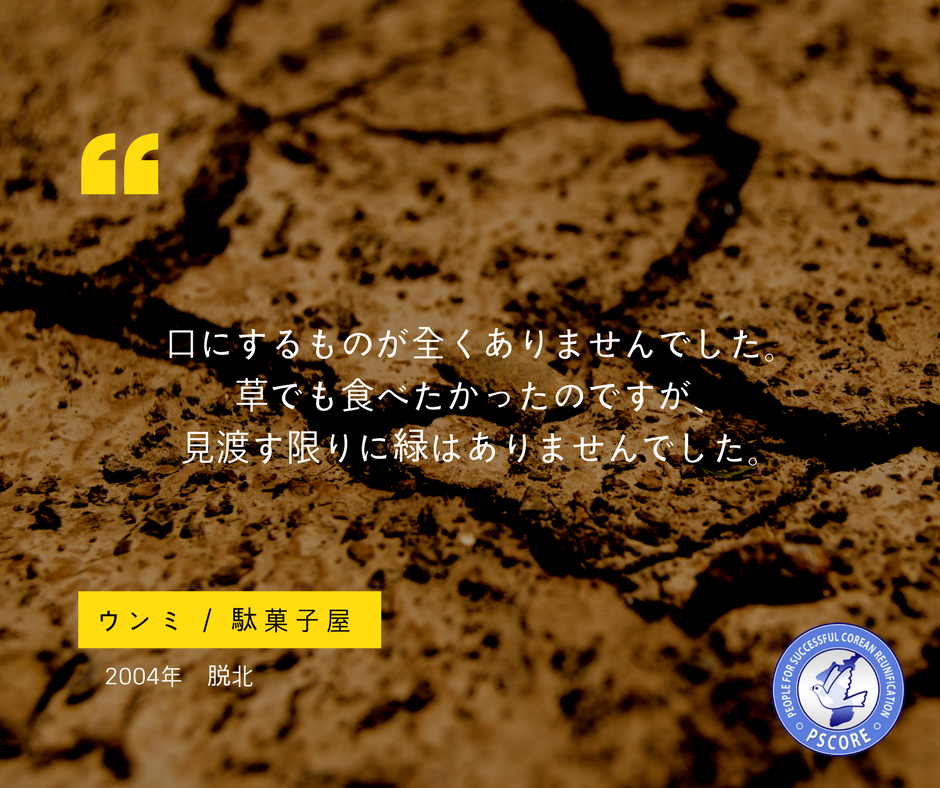
''I didn't have anything to eat. I wanted to eat grass at least, but as far as I could see, there was no green around''-Eun-mi (escaped in 2004)
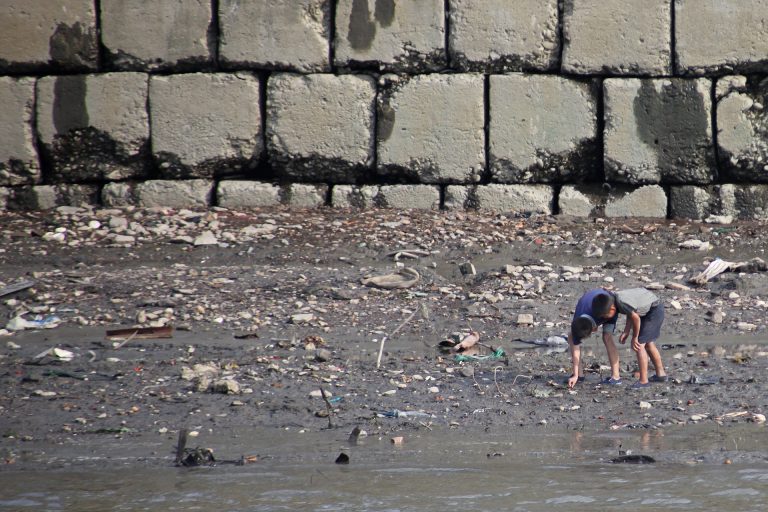
食べ物を探し彷徨う子どもたち
Children wandering in search of food
不法監禁
(Illegal confinement)
北朝鮮が絶対に認めないのが政治犯収容所(管理所)の存在です。裁判なしに宣告を受けるのは当たり前で、被収容者たちは日常的な暴力と空腹に苦しみながら強制労働をさせられます。
北朝鮮の住民が最も恐れていることは政治犯の罪を問われ政治犯収容所に収監されることです。「忠誠心を失った人物」と一度記録されると、本人はもちろん家族や子孫までもが処罰の対象になります。自殺も罪になり家族に罪が移るため、拷問を受けても簡単に命を断つこともできないのです。
What North Korea never admits is the existence of a political prisoner camp (administrative camp). It is natural to be sentenced without trial, and detainees are forced into labor while suffering from routine violence and hunger.
The biggest fear for North Korean residents is that they are charged with political prisoners and imprisoned in political prison camps. Once recorded as a "person who has lost loyalty," the person, as well as his family and offspring, are subject to punishment. Suicide is also a crime and the crime is transferred to the family, so even if tortured, it is not easy to commit suicide.
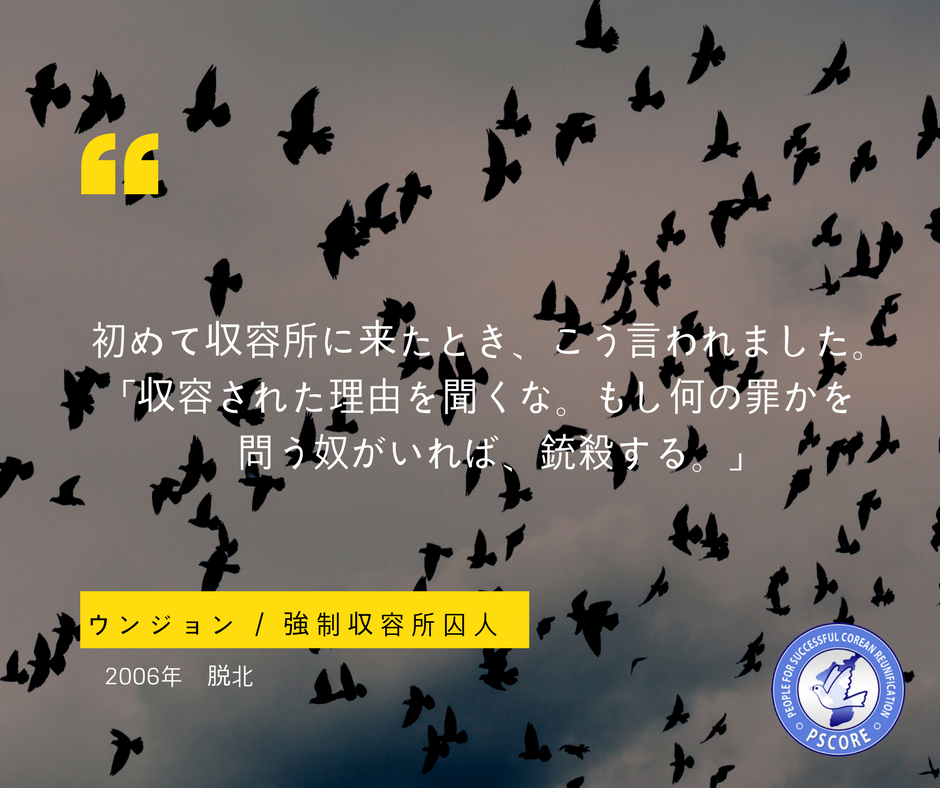
「政治犯収容所の中で25号だけは、確かな反動行為の証拠がある場合のみ行くことになっています。25号輸城教化所に入ったら生きて出てくることはないと思えばいいです。」― ミンチョル (15号耀徳収容所 3年収監)
''Only No. 25 in the political prison camp is to go only if there is solid evidence of recoil. If you enter the No. 25 Suseong Education Center, you should think that you will not come out alive. -Minchul (experienced a 3-year imprisonment in the No. 15 Yodok Concentration Camp )

いかがでしたでしょうか?これが、ドラマでは語られなかった北朝鮮の真実です。しかし、これらはまだまだ序の口です。北朝鮮ではこの他にも多くの人権侵害が日常的に行われています。
These were the truths about North Korea from a human rights viewpoint that was not told in the drama. However, these are just the beginning and many other human rights violations are common in North Korea.
これからも北朝鮮の人権と真実を皆様にお伝えするべく頻繁にブログ更新をして参りますのでどうぞご期待ください!
We will continue to update our blog frequently to tell you more about the human rights issues in North Korea, so please look forward to it!
私たちのウェブページでは、北朝鮮の人権と真実についてより詳しく学ぶことができます。ぜひチェックしてみてください!☞http://pscore.org/home-ja/
これからもPSCOREをよろしくお願いします。☺︎
You can learn more about North Korea's human rights and truth on our homepage. Please check it out!
We look forward to your continued support of PSCORE. Thank you!:)